| |||||||
| Search Forums |
| Advanced Search |
| Go to Page... |
 |
| Search this Thread |  741,232 views |
| | #1 |
| Team-BHP Support  | Honda City Hybrid Review Honda City e:HEV (Hybrid) ReviewHonda City Hybrid Pros• 20+ km/l fuel economy in city driving conditions, giving it lower running costs than a diesel! • Seamless Hybrid system that makes driving a breeze. A car you will enjoy driving in traffic • Tractable power unit that delivers performance on par with internal combustion counterparts • Loaded with safety tech such as ‘Honda Sensing’ consisting of lane keeping assist, lane departure mitigation, adaptive cruise control, auto high beam, collision mitigation braking system as well as ESP, 6 airbags and a lane watch camera • This generation of the City feels grown up in terms of overall feel & exterior dimensions • Spacious cabin will keep your family happy. A sedan you’d love to be chauffeur-driven in as well • Compliant ride quality in the city. High speed bounciness (rear) reduced due to beefed up suspension & battery pack weight • Honda's proven reliability is comforting, as the hybrid system is complex • Lower emissions in the city. Will appeal to the environmentally-conscious customer Honda City Hybrid Cons• Not a car for enthusiasts - it feels like an alien experience and completely disconnected • Honda Sensing ADAS system is too intrusive for Indian highways; requires the driver to adapt to it and be comfortable using it • Boot space is compromised due to the battery pack and spare tyre. Down from 506 to 306 litres! • We’re worried about the price. Honda is usually optimistic with pricing, and there is no lower variant without the ADAS features • Build quality still feels light and not as reassuring as competitors • Overall road and tyre NVH levels should have been better to keep up with the refined & silent hybrid powertrain • Missing features for this price point = powered seats with ventilation, rear side sunblinds, wireless charging… • Honda City Diesel will give you comparable running costs at a far lower price • Some misses such as the puny 185-section tyres (upgrade is mandatory), outdated audio head-unit, ICE sound quality is just average The 2023 Facelift • Link to report IntroductionIt's been a long time coming, but India finally gets its first proper mainstream hybrid car. Honda themselves have tried to sell their hybrid cars in India in the past. The Civic Hybrid, which was brought in as a CBU, was priced astronomically and moreover, the Hybrid system was a mild one, not really offering massive efficiency gains. Then came the Accord Hybrid, which was again, a CBU. This had an excellent hybrid powertrain with good efficiency gains, but being a CBU, it was priced stratospherically. They say, "the third time's the charm" and Honda sure must be hoping this comes true with the Honda City e:HEV - a full hybrid version of the City that is not imported as a CBU, but made locally in India. While there is a push for EV's in India, a hybrid is actually the perfect stepping stone before going full electric. It offers better fuel efficiency, which reduces running costs considerably and at the same time, doesn't have the biggest concerns with EVs - charging infrastructure and range anxiety. Till the time we see homes with charging options and a good network of charging points along the highways, the move to EVs will be slow. Hybrids can help plug this gap. Petrol prices are going up and diesel cars are not considered clean with the tightened emission norms. The only option is to look at extracting the maximum from petrol engines and efficiency is the new mantra. The Camry Hybrid has been the only proper hybrid that has sold in reasonable volumes in India even though it is priced north of Rs. 50 lakhs. This shows that hybrids do have a market in India and if sold at a lower price point, may very well carve out their own niche. Having learnt their lessons from the earlier models, Honda is trying to make amends. The City Hybrid is locally produced. The electric motors, batteries and power control unit are imported from Japan, but the rest of the car is the same City that is locally made here in India. Even the engine block is the same locally made unit from the non-hybrid model. The head however is imported owing to the fact that the engine now runs on the Atkinson cycle. Secondly, the hybrid system is one of the most advanced hybrid units out there, which works as a series parallel hybrid motor with no gearbox and a host of other technology that is explained later on. The City e:HEV isn't merely a mild or smart hybrid system, but a full-fledged hybrid that doesn't even connect the internal combustion engine to the wheels. Only the electric motor has a direct connection to the wheels. This means that the real world efficiency of the car will be far superior to the regular petrol model and could give the diesel a close run for its money in terms of running costs. A real world efficiency of 20+ km/l is easy for the e:HEV. Honda has also decided to launch the City Hybrid in a single top trim and loaded it with additional features. The company hasn't skimped on safety either and the City is now the most loaded car when it comes to technology. Though for the image that the City has, it does lose out on some convenience features. Honda should have equipped it with powered driver seats, ventilated front seats, side rear sun blinds, wireless charging etc. Design & StylingThe City Hybrid gets very subtle tweaks over the regular car in terms of styling. On the road you can't tell them apart unless you go up close and spot the small details. The first give away is the Honda logo at the front and rear that has a blue surround. At the front there is a new radiator grille with a honeycomb mesh and the foglamp surrounds get a claw like design element. The rear has more notable differences with the e:HEV badge indicating that it's a hybrid. You also get a neat boot lip spoiler and a redesigned bumper with a faux diffuser with a carbon-fibre finish. The overall styling of the 5th-gen City remains smart and clean. It has grown in size vs the 4th-gen car and now is almost Corolla Altis-like in terms of presence. In fact, the overall length is 9 mm more than my 2009 Corolla Altis and it shows on the road. Some might say that the City is no longer as sharp as the outgoing car, but in my opinion, it looks more grown up with styling that will age well over time. Build Quality, Fit & FinishThe City Hybrid being the same as the regular car continues to have the same light feel. The overall kerb weight may have gone up by 127 kg, but that is due to the batteries and motors that have been added and not due to any change in sheet metal or build. The doors don't close easily when shut lightly and need a firm push. They don't have the solid feel or make the "thud" sound on closing as European cars. There are also some panel gaps, especially between the rear bumper and quarter panel, that we noticed. That said, it does feel improved over the previous-gen car and Honda has done a really good job in the paint department. The red car in the photos was really popping with an excellent finish. Wheels & TyresThe City Hybrid continues with the same 16" wheels and 185/55 section tyre combo as the non-hybrid car. This is obviously done for better efficiency, but the downside is that the car looks under-tyred and now, with the larger body dimensions, the stance is ruined. On our test cars we saw 2 tyre options - Bridgestone Ecopia and Goodyear Assurance Triplemax. Surprisingly Honda hasn't gone with low resistance or low road noise tyres for the Hybrid. The spare tyre is a 15-inch space saver with a 135/80 section tyre. Ground ClearanceHonda hasn't specified the exact ground clearance, but it did confirm that despite the 127 kg extra weight, the ground clearance of the City hybrid remains identical. We didn't scrape it anywhere even with 3 on board, "missing" a couple of large speed breakers. However you still need to be careful of really sharp speed breakers, especially the front chin which had a tendency to scrape. Standard & Extended WarrantyThe standard warranty remains 3 years / unlimited km as with all Hondas. However, the company has added an additional 8-year warranty on the Lithium-ion battery. This should allay any fears on the long-term life of the battery. Although, Honda should have probably added a cover on the power unit and 2 motors as well for complete peace of mind. SafetyThe City e:HEV will only be available in the top end ZX trim, which means it gets 6 airbags, VSA etc., but the highlight of the package is that the car is equipped with Honda "Sense". This is the safety suite available globally, which is essentially ADAS. The system consists of CMBS (collision mitigation braking system), LKAS (lane keep assist system), RDM (road departure mitigation), auto high beam and adaptive cruise control. Apart from Honda Sense, you also get TPMS, hill hold assist, electric parking brake with auto hold and the lane watch camera. Cabin Design & QualityStep into the City Hybrid's cabin and you will be greeted by a familiar design, but with some welcome changes. There is a new ivory & black dual-tone interior colour scheme exclusive for the Hybrid. This is less beige and more greyish. Must say I prefer this over the creamy beige. Other than that there is one significant change in the center console. The City Hybrid does not get a manual handbrake. Instead it has an electric parking brake with auto hold. This frees up space behind the gear lever to keep a large smartphone comfortably. Overall, the interior quality remains same with hard plastics all over, but everything is well finished with no ill-fitting pieces noticeable. The 5th-gen design also is a lot more mature and less swoopy with clean symmetrical lines, which wasn't the case with the 4th-gen car's interior. Space & ComfortThe City has always been known for space and comfort and the same holds true for the Hybrid. Space at the front is ample with good seat travel and the seats themselves feel plush. They are manually adjustable with the driver's seat adjustable for height as well. The seats have a good travel range. The soft leather padding on the center armrest and the door armrest gives the driver a very relaxing drive experience. The one gripe I had was with lack of lumbar adjustment. The seats don't lack in lumbar support. Rather the lumbar support was a tad more than what I preferred. Driving Position & ErgonomicsThe ergonomics are typical Honda - perfect. Everything falls perfectly to hand and is within easy reach. Steering adjusts for rake and reach both with a good range. The seats go sufficiently low down for the tall drivers. The footwell has ample space and a massively wide dead pedal. Frontal visibility in the 5th-gen car with the lower set dash is also better vs the 4th-gen with the swooping high set one. Cabin StorageThere is plenty of cabin storage at the front. The front doors can hold a 1L bottle and some knick knacks each. The glove box is of a reasonable size, but it isn't cooled or illuminated. You get two cupholders in front of the gear lever as well as small tray for loose change or keys. Next to the air-con controls, there is a shelf to keep a smartphone. With the electronic parking brake, you also get space behind the gear lever to keep another phone. The center armrest storage space also is generous. You get 2 USB ports and a 12V charging socket as well. Air-ConditioningBeing a Hybrid, the air conditioning is not like conventional cars. Since the petrol engine turns off when the car is in EV mode, the compressor cannot run off any accessory belt mechanically. The compressor in this case is an electric compressor like the ones at home powered by the Li-ion battery pack in the boot. The air-conditioning was effective with the temperature in Bangalore above 35C and we never had to keep the climate control temp below 23C for the 2 of us sitting in front. The blower speed however was at level 4 or 5 to keep the temperature under control. It sounded as if it was working hard to cool the cabin. We also realised that you have to either lower the temperature of the climate control to 20-21C or increase blower speed (manual mode) for the rear seat passengers to be happy. The rear seat passengers do get 2 adjustable blowers, but they are only effective if the blower speed is above 3 at the front. Another bummer is the lack of factory-fitted tinted glasses (like what Maruti gives). When driving the XL6 a few days earlier in the same weather and route, the heavy green tint on the window was a blessing. Audio System & Sound QualityThe infotainment system remains identical to the regular City variant with an 8" touchscreen and 8 speaker audio. It has the ubiquitous connected tech nowadays with smartphone and smartwatch connectivity. You can do a remote start and turn on the air-conditioning sitting at home and the system also links with Alexa and Google assistant for remote voice commands. The touch screen isn't the slickest and quickest to respond and the UI seems a bit dated. We didn't spend too much time with it as it has limited use and doesn't show the hybrid details like power flow on it. Audio quality was not really wow and does not have any branding like Sony or JBL or Bose to brag about. We didn't really spend time on the audio as we wanted to focus on the Hybrid powertrain. Rear Seat Comfort & SpaceThe City has always been the bench mark in rear seat comfort and it has only got better with the 5th-gen car. The Hybrid is unchanged at the rear except for the right side seat back which has a vent in it for cooling the battery pack using the cabin air conditioning. Legroom is ample and seats are on the softer side resulting in very comfortable cushioning for the body. While the lack of adjustable rear headrests is glaring, the fixed units are soft comfortable and effective even for a 6' tall passenger like me. You also get rear rolling sunblind for the rear windshield. This is much needed as the AC blower is only effective at higher fan speeds at the back. Honda should have given blinds for the side windows as well for a flawless rear seat experience. Below the rear air-con vents, you get 2 x 12V charging ports. Both front seats get back pockets with 3 individual pouches. 2 pouches are perfect to hold your smartphone and one bigger one for the usual rear seat curios. Boot SpaceHybrids have one big disadvantage and that is the smaller boot compared to regular cars. When you have to pack in 2 electric motors, a power control unit and an internal combustion engine, the boot is the only logical place to keep the battery back. Honda has tried to do some clever packaging by placing the battery pack in the wheel well of the spare tyre. However, this means that there is no space for a full size spare. International variants of the City e:HEV don't come with a spare and only a puncture repair kit. But, we all know this won't work in India. Honda has opted for a space saver tyre and rather than leave it open in the boot, neatly covered it and packed Styrofoam around it to get a flat floor. The non-hybrid City has a massive 506-liter boot. The boot space in the Hybrid drops down to 410 liters globally and the India-spec car with the space saver gets only a 306-liter boot. This means you can at best keep one suitcase lying flat and nothing on top. You can fit three suitcases, but all need to be lying flat as the height of the boot is seriously compromised. If you do need to carry more luggage you can remove the space saver and all the Styrofoam to have the full boot available to you. Below the boot floor you do get lots of storage areas which are nifty. This seems like a fair compromise and more practical as you still get the full depth but lose out on height. Last edited by Aditya : 9th March 2023 at 11:19. |
| |  (70)
Thanks (70)
Thanks
|
| The following 70 BHPians Thank Vid6639 for this useful post: | AayushPopat_97, amol4184, beemrao, Bubby, bullock-Car, CEF_Beasts, Chethan B G, COMMUTER, Cyborg, dailydriver, Dani7766, dkaile, Dr.AD, fluidicjoy, FlyWheel8, FueledbyFury, Gaboonviper04, GaryTSI, Goku_YNWA, GTO, GwD, g_sanjib, Harjot37, hdman, InControl, Jangra, JigarKansagara, jomson13, lemedico, libranof1987, Lobogris, Meph1st0, N33raj, naadopaasaka, neil.jericho, Osteon206, pat8ack, pd1108, Peri_patetic99, PowerSpike, prash1892, Rahulkool, RakishRam, RavenAvi, ravib, rideon74, rkv_2401, roby.thomas, ron178, saisree, SatishBisht, shancz, shashanka, Shreyas Aterkar, SnS_12, stringbh, Swarup5, tabs_vs_spaces, TheCatalyst, theexperthand, themonster, The_Outsider!, uday.ere, vaasu, VALLURIS, Varun_HexaGuy, vb-saan, vvrchandra, yogiii, ysjoy |
| |
| | #2 |
| Team-BHP Support  | Honda calls its hybrid tech e:HEV, which is part of the "e:" branding for its hybrid and electric technologies. HEV stands for Hybrid Electric Vehicle or, as Honda calls it, self-charging electric vehicle. The hybrid power unit in the City is similar to the earlier Intelligent Multi-Mode Drive (IMMD), but redesigned to fit into smaller applications like the Jazz and City. If you want to geek out on how the entire system works in detail, click on this link to see how the system works in the Accord Hybrid. Here's a video that shows how the system works: In the City Hybrid, Honda has used two electric motors. One works as a generator connected to the engine and the other works as a traction motor driving the wheels. This means that there is no real direct connection to the wheels or the internal combustion engine. With this unique system, Honda has completely done away with the transmission. The system works more like a series hybrid system, but switches to a series parallel system in certain driving conditions. The wheels are mainly driven by the traction motor. The traction motor gets power from two sources - the battery pack in the boot and the generator connected to the petrol engine. If the battery is depleted or more power is needed the IC engine covers the deficit by charging the battery or supplying power to the traction motor via the generator motor. The petrol engine is the same 1,498cc i-VTEC motor from the non-hybrid City. However, it now runs on the Atkinson combustion cycle with a power output of 97 BHP. The entire head is all new and imported from Japan vs the block, which is common. The traction motor is the larger motor that drives the wheels and is capable of producing 108 BHP. The generator motor can produce 94 BHP. The Lithium-ion battery back in the boot is a high voltage 172.8V unit. However, all these power figures are immaterial and what matters is the final power and torque figures from the combined system - a healthy 124 BHP and 253 Nm available from standstill. The whole system has three main modes of operation depending on several factors. EV mode - EV mode is available at slow speeds with light throttle inputs and when the battery is charged. This mode is pure electric. The IC engine does not run at all. The traction motor drives the wheels using the power from the battery pack. Generally, up to 40 km/h, the City remains in EV mode unless the battery level dips below the minimum. Hybrid mode - This mode is the main mode the City operates in. At city speeds, when the battery level is low the car will be in this mode. Above 40 km/h, it will be in this mode most of the time and above 120 km/h, it will be in Hybrid mode only. Hybrid mode is when the IC engine is running along with the electric motor. This mode has two different conditions. The IC engine will only come on at idling rpm to top up the battery charge so that the traction motor can continue to drive the car or when you need greater acceleration, the IC engine will rev up and drive the generator motor to provide more power to the traction motor as well as charge the batteries. In this mode the IC engine is still not driving the wheels mechanically, but driving it electrically. Engine Mode - This mode is engaged somewhere around 80 km/h till 120 km/h. What this mode does is check when the speed is optimal for the engine to drive the wheels, which is basically the sweet spot for a petrol engine to give the best efficiency. In this mode a clutch is engaged and locks the engine to the wheels in a single ratio, which is similar to a tall fifth gear ratio. This means that the IC engine is now mechanically driving the wheels. If you need to perform an overtaking manoeuvre in this mode, the system immediately shifts back to hybrid mode and disconnects the clutch. While the system might sound complex it is in fact very seamless and effortless to use from a driver's point of view. The driver is completely disconnected from what happens and when it happens. There is no Sport mode or manual mode to override any control over this system. The only thing the driver can do is use the paddles behind the steering wheel, which don't have anything to do with gears, since there is no gearbox. The paddles simply control the level of regen braking needed. You get three levels to choose from. The left paddle increases the level to stronger deceleration and right paddle reduces it. You don't need to use the brake pedal. Just use this to slow down almost till a standstill. However, to come to a complete halt you will need to press the brake pedal. The electric servo braking system regenerates energy when pressing the pedal lightly. Driving the Honda City HybridHybrid power unit is packed tightly in the engine bay with the 1.5L petrol engine and the two electric motors: 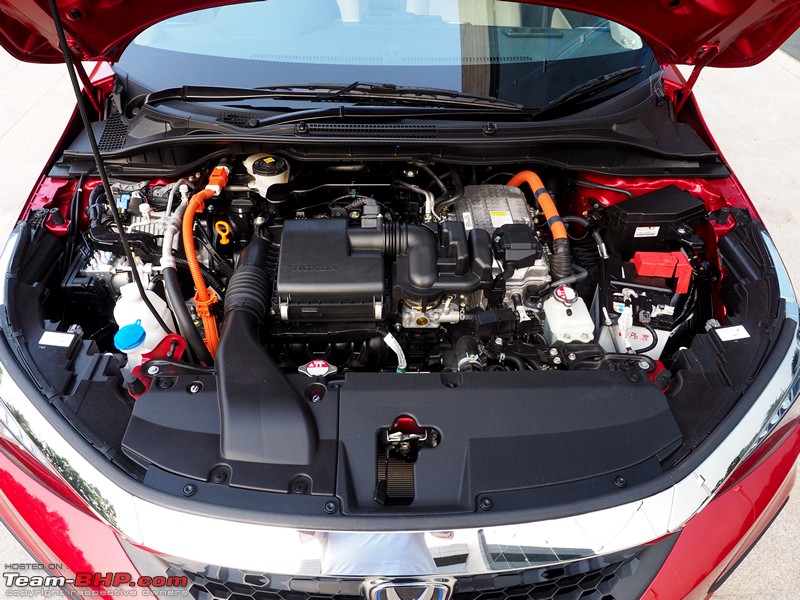 Now that we have the nitty-gritties out of the way, let's see how the Honda City Hybrid actually feels to drive. When you start the car using the "Power" button, the only way to know that the car is on is via a small "READY" warning light in the instrument cluster. Lift your foot off the brake and the car starts creeping forward with zero noise or vibrations. It's creepy as we accidentally got down from the car while it was in D mode and turned on, but there was no engine running sound to warn us! This could even be a problem for pedestrians and Honda actually has an external acoustic warning system that plays a sci-fi whine when car is moving in EV mode. This sound can't be heard inside the cabin. At slow speeds inside town, the City hybrid is effortless to drive. It tries to stay in EV mode as much as possible and occasionally, you will faintly feel the IC engine turn on to charge the battery and then, turn off again after a while. If you prod the accelerator a little more to close a gap, the IC engine kicks in and provides the required shove. While there is good amount of torque available from standstill, the City Hybrid will not leave the traffic lights in a hurry. It's more relaxed acceleration than urgent. If you have a relaxed driving style, the City offers a calm and serene driving experience like nothing else. You won't feel tired even after hours driving it in traffic. We were looking around for places with more traffic just to see if there was something that would catch it out. On the other hand, if you drive enthusiastically and with a heavier right foot, it's a very alien experience. Press the throttle hard and you hear the IC engine fire up and scream at high revs (no tachometer, so we have no clue at what rpm), but this high revving has no correlation with what is really happening on the road, which is smooth linear acceleration albeit a little faster than normal. That's because the IC engine is actually revving up to charge the batteries as well as drive the generator to, in turn, give more power to the traction motor. What's even more freaky is that when you do floor the A-pedal, you actually hear the revs go up and then you hear a blip that resembles an upshift and then again after a few seconds, the throttle blips like an upshift to the next gear. This makes no sense as there is no gearbox and you don't actually feel any interruption in power delivery. It's just the sound of revs changing. Initially, you think that this must be some fake sound from the speakers, but then you realise that the engine is actually replicating upshifts by changing rpms with no change in power delivery. Honda have simply engineered the rpm to blip to give the feeling of driving a car with a gearbox. With all the artificial feel of gear shifts and high rpm screaming drama, the actual on-road acceleration is pretty decent. The City gets up to triple digit speeds reasonably quickly. Out on the highway, the City Hybrid responds to throttle inputs in a more linear manner. At around 80 km/h you can see a small symbol light up on the power flow meter indicating that the clutch has engaged the engine directly. Speed changes are more linear with throttle inputs and you can effortlessly cruise at triple digit speeds. When you do want to speed up to slot into a gap, the Hybrid unit disengages the mechanical clutch and seamlessly goes back into hybrid model. That said, don't expect to close tight gaps or pull off overtaking manoeuvres on a single lane carriage way without some planning. The trick is to be progressive with the throttle and not keep stomping on it expecting instant acceleration. The difference between the regular City and the Hybrid is like two different employees in a team - one when pushed hard will make noise initially, but will ultimately deliver. The other when pushed hard will analyse, assess and deliver quickly and calmly. All this culminates down to one thing and that's fuel efficiency. Honda claims an FE figure of 26.5 km/l for the City Hybrid. We drove normally through a crowded town, then through some narrow single lane village roads and finally on a 6-lane highway towards Bangalore Airport. The total distance was 90 km and we weren't trying to be frugal or hyper-miling. We managed 21.1 km/l till we stopped for 20 minutes to take pictures and the air-con reduced the figure to 20.6 Kmpl. This translates to comfortable 20+km/l in real world city usage and probably 10% lower out on the highway. Even though the hybrid system feels and is completely disconnected, it was quite a lot of fun watching the car change between modes on the MID seamlessly and just watch the fuel efficiency gauge show 20+ km/l. In fact, it was more entertaining than the regular City CVT. Even with a refined petrol motor and electric operation, Honda have given insulation under the bonnet: 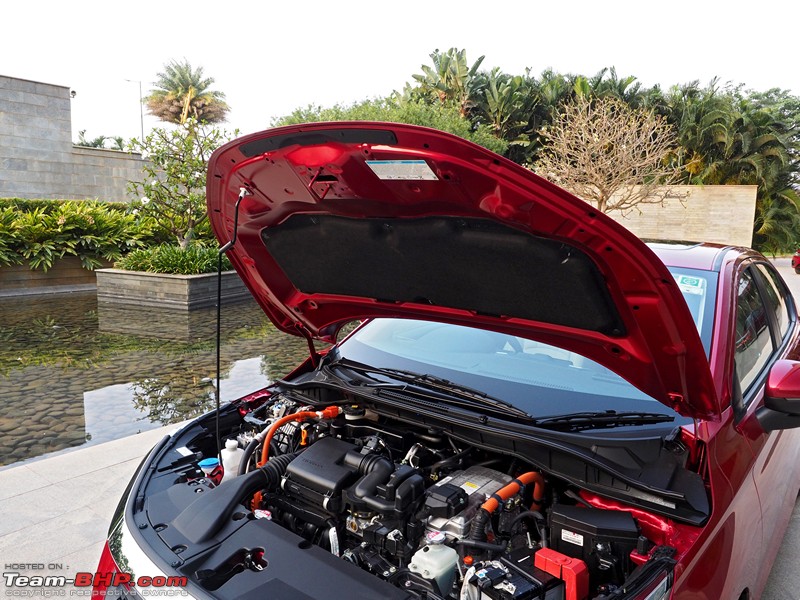 Orange cables indicate high voltage lines. The lines to the left are for powering the electric water pump and electric AC compressor from the battery and the one on the right is the power cable from the battery to the electric motor: 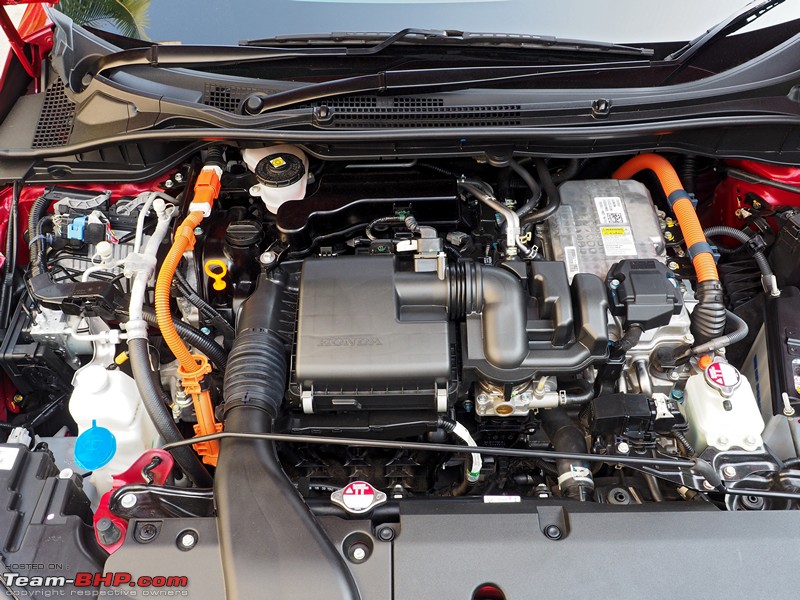 What's intriguing is that the aluminum box is the primary power unit of this car with two motors inside. The IC engine to the left is for supporting the electric unit. Notice the 2 hoses at the front: 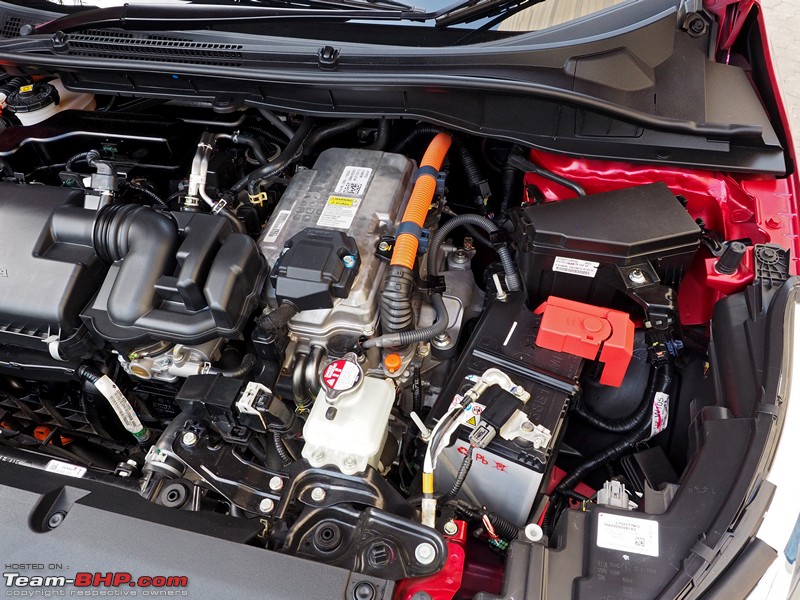 The 2 hoses go to a small radiator that sits behind the fog lamp but is fed air from the centre of the grill. The radiator is for cooling the power unit: 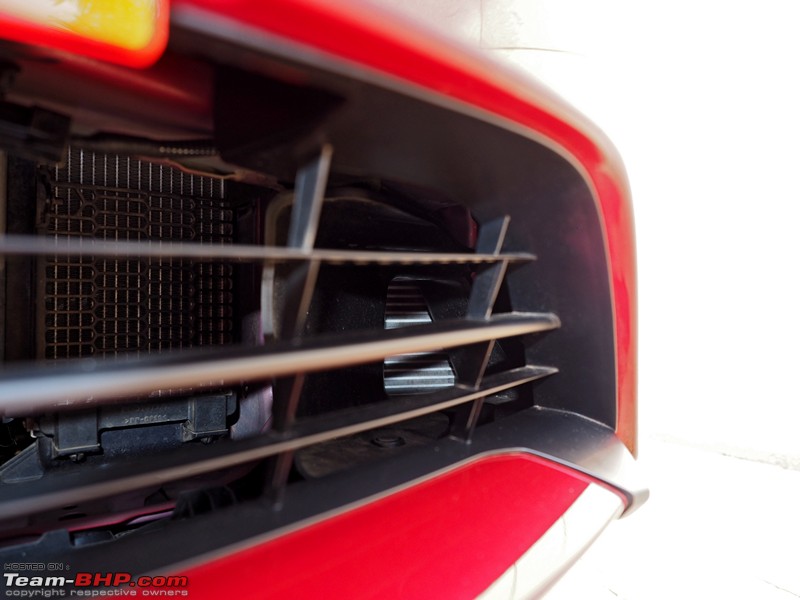 IC engine mounts look beefed up for the constant on/off that happens in hybrid mode to ensure that occupants don't feel the motor turning on and off: 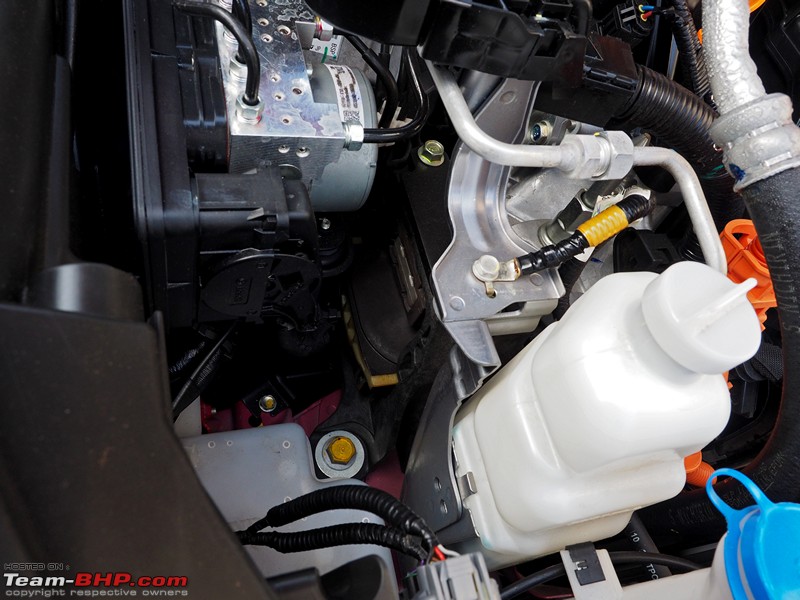 Standard 12V battery is mainly for powering the accessories inside the cabin:  Warning on the bonnet lid indicates that the Li-ion battery needs to be used once every 3 months: 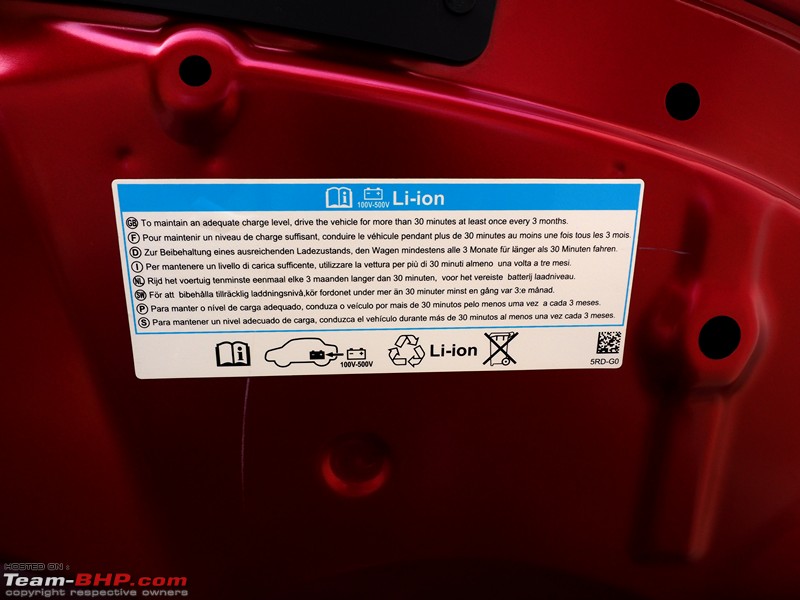 Underbody is well protected as it should be for a complex hybrid unit: 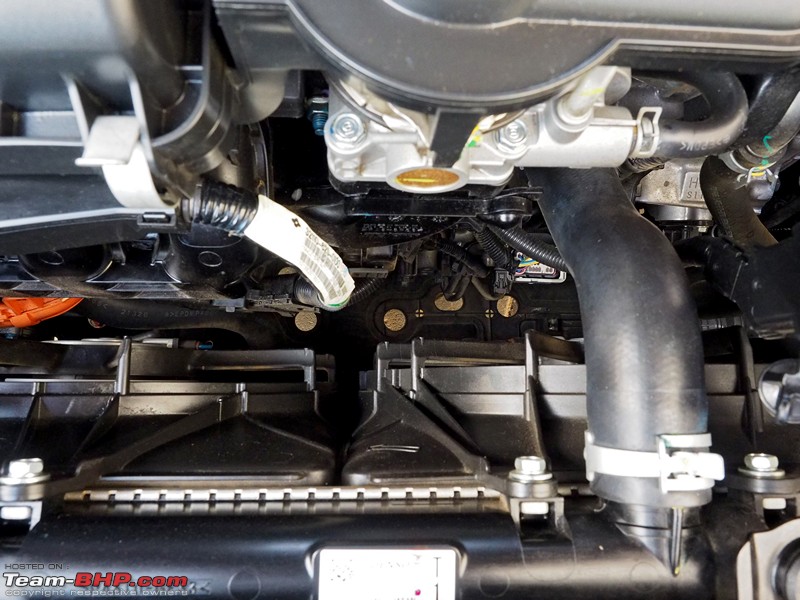 Gear shifter has no Sport mode. The Econ button just dulls throttle response but doesn't change the hybrid operation. B mode is use for driving downhill with the paddle used for adjusting the regen level: 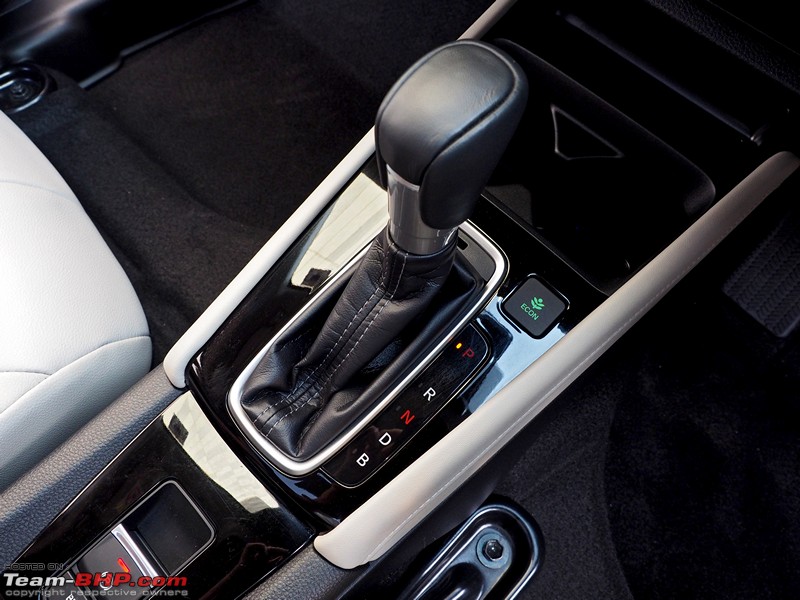 Real world FE of 20 km/l is easily achievable. This is what we got after 90 km of driving in mixed conditions of single lane village roads, crowded city roads and open highways: 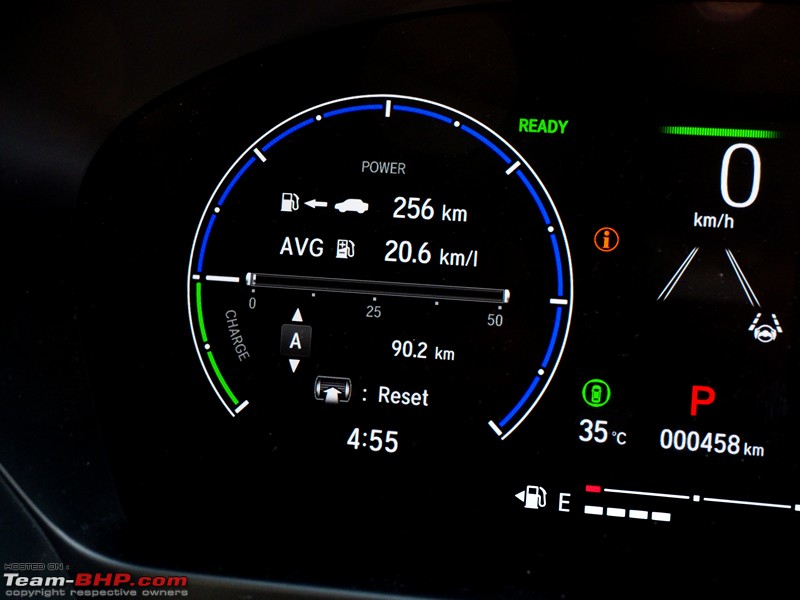 Notice the power flow diagram below on the MID. When you see a small gear lever in between the power flow it indicates that the mechanical clutch is engaged and the IC engine is mechanically connected to the wheels: 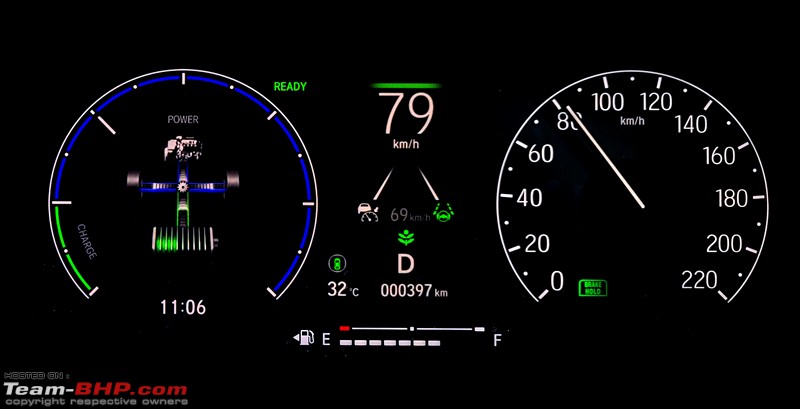 Using the paddles in D mode adjusts the regen level. Here you can see regen level is set to max (level 3) depicted by the 3 down arrows next to the D symbol. In the D mode regen goes off after a few seconds to the default mode. The idea is to use this mode when driving in the hills or when you want to manually enable higher regen when rolling to a stop light. It's very cool to just click on the paddle when rolling to a stop light vs pressing the brake pedal: 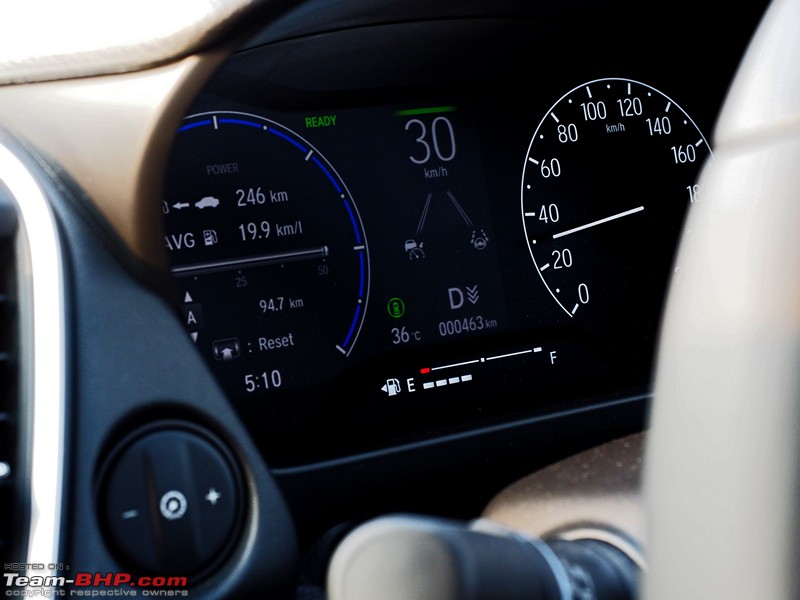 If you want to keep the regen permanently on, you can move the gear shifter to "B" mode and then use the paddles to adjust the regen level. This will always keep the regen level to what you set using the paddles: 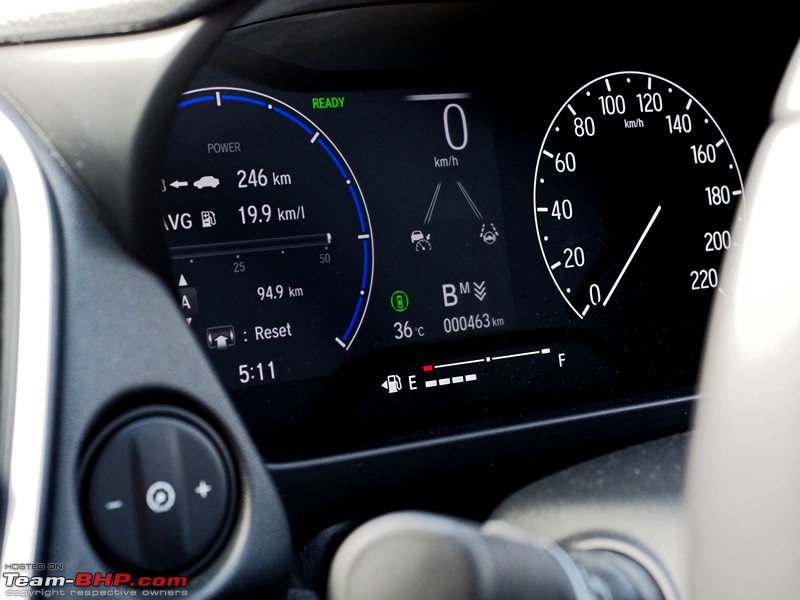 SuspensionThe dynamics of the Hybrid City are quite different from the non-hybrid version. This is primarily due to the fact that the Hybrid has a kerb weight of 1,280 kg, which is 127 kg more than the petrol's 1,153 kg. This extra weight has been distributed at the front with the electric motors and the rear with the battery pack in the boot right between the rear wheels and low down. As a result, the suspension has been beefed up and is now on the firmer side to deal with the additional heft. Overall, the City Hybrid manages the extra weight very well. Ride ComfortThe ride is very comfortable at slow speeds and it's only the sharp potholes and big speed breakers that are noticeable inside the cabin. The suspension is still on the softer side giving it a plush ride, but now, with a bit of underlying firmness. Handling & DynamicsModerator Ajmat mentioned that it was a doddle to drive in city conditions and even on straight highways. As speeds build up car remains stable and the extra weight of the battery in the rear even keeps the rear of the City hybrid planted with none of the perceived bounciness that was reported from the non-hybrid version. Handling too is very decent as I found out with Ajmat approaching a trumpet ramp of the airport flyover with no signs of slowing down. The City Hybrid held its line well with no squeal from the tyres. The car will maintain its line through a corner well partially due to the lower center of gravity and the weight distribution. However, there is no feedback about the limits. One of the most unnerving traits about the City Hybrid is the fact that you cannot throttle steer during hard cornering and balance the car on the throttle. Usually you apply throttle to power out of a corner and shift the weight to the rear or lift off to tuck into a corner tighter. Since the throttle has no direct correlation, even when you lift off, the hybrid system decides whether to keep powering or coast or regen. The good thing is that you can't disturb the car easily mid-corner. On the same trumpet flyover loop, Ajmat had lost the rear of the Civic mid-corner, but then caught it just in time. Overall the City Hybrid's handling is very inert, but it handles aggressive manoeuvres quite well. You need to just focus on steering and not bother about anything else. BrakingThe City Hybrid's braking is quite different from the regular City's. For a start, the rear now gets much needed disc brakes. Secondly, it now has an electric servo braking system that does the regenerative braking initially and then applies the regular friction brakes. Just like the power train, the system is seamless and actually has some amount of feel. Usually, the regen brakes are completely devoid of feel and you always end up misjudging the braking point. In the City Hybrid, this is not the case. The brake feel is very natural and progressive and we couldn't make out whether it was the regen system of the friction brakes doing the braking. Braking from high speeds is confidence-inspiring as well. Last edited by Aditya : 2nd May 2022 at 11:04. |
| |  (57)
Thanks (57)
Thanks
|
| The following 57 BHPians Thank Vid6639 for this useful post: | 400notout, anandpadhye, Bubby, Carpainter, CEF_Beasts, Crazy_cars_guy, Cyborg, dkaile, Dr.AD, electro-monk, fluidicjoy, GaryTSI, gearedup, GKMahajan, Goku_YNWA, GTO, GwD, Harjot37, InControl, jomson13, Kashish, libranof1987, Lobogris, MDED, Meph1st0, N33raj, naadopaasaka, neil.jericho, pd1108, Peri_patetic99, Rahulkool, Rajeevraj, RavenAvi, rideon74, rkv_2401, ron178, saisree, SatishBisht, shashanka, Shreyas Aterkar, SILVER-ARROW, SnS_12, SRISRI_90, SS-Traveller, sunikkat, theexperthand, The_Outsider!, uday.ere, vaasu, vb-saan, Venkatesh, vineetklkrn, Voodooblaster, vvrchandra, yesyeswe, ysjoy, Yuvuz |
| | #3 |
| Team-BHP Support  | Honda SensingHonda Sensing is a collective name for a host of safety features. The system is centered around a high performance wide angle camera with a range of approximately 120 m:  The sensor is so vital that the Honda has resized the wiper blades to ensure the sweep pattern covers the sensor area:  The safety features that are components of the Honda Sensing Suite are as follows:
Ajmat and I tried out most of the Honda Sensing features and Ajmat has put down his observations of the tech. Collision Mitigation Braking System (CMBS)" Did we get to try it? Even accidently? Nope, the good folks at Honda really did not dare encourage us but like Big Brother, Twitter etc. It is always there. Compared to Volvo's system, it is non-intrusive and does not alert you well in advance. We can only assume that it works at the very last minute. The warning lights are present in the instrument cluster. Can we switch it off? Yes. But the CMBS will come back on after every power / ignition ON-OFF cycle. This is intentionally done as a safety. Road Departure Mitigation System (RDM)" This monitors the edge of the road and warns you if you seem to be erratic and driving off the road (happens with drowsy drivers): 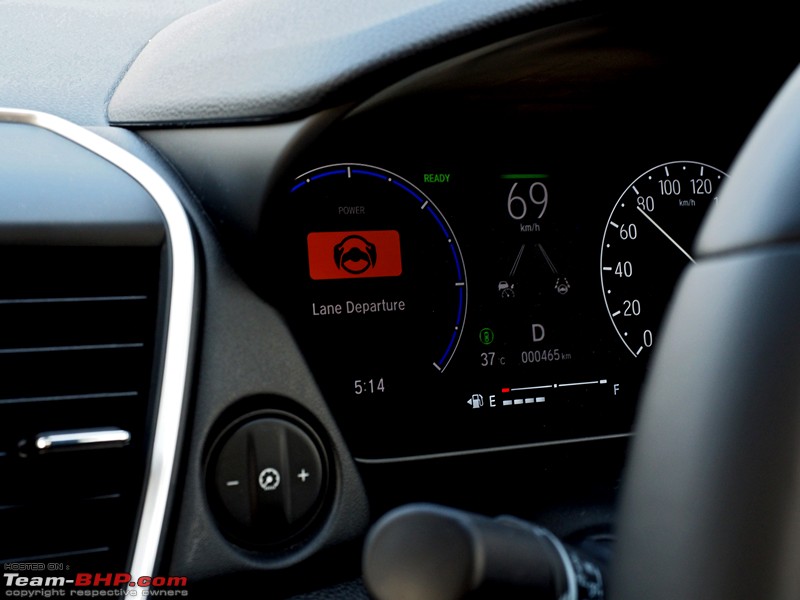 How does it work? If the motion path of the car fails to follow the contour of the edge of the road, the steering icon on the instrument cluster will appear along with an audio warning, the steering will vibrate and apply some torque against the direction of the road edge and enable you to steer on the straight and narrow. This helps in compensating for any dulled response time. This is annoying. Can I switch it off? If it finds you indifferent to the warnings for several instances, it will shut down, but will restart after a few minutes: 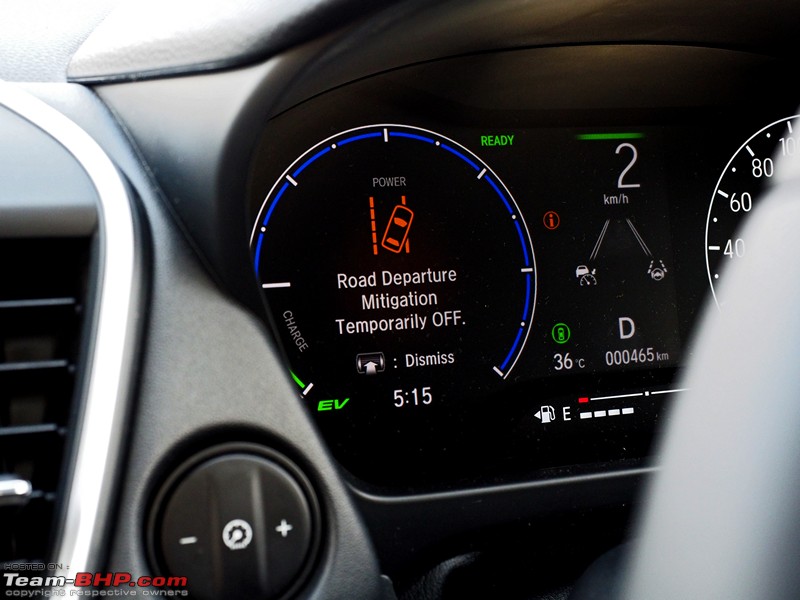 But I don’t want it on at all? All is not lost - there is a two factor deactivation required to avoid accidentally switching it off (applicable to the CMBS system also). One presses the safety support switch. Once selected, you then select an option on the driver information interface to switch it off. The symbol switches from green (active) to grey (inactive). This is an example of Pokayoke - Japanese for fool proofing so that nothing can get switched off accidentally: 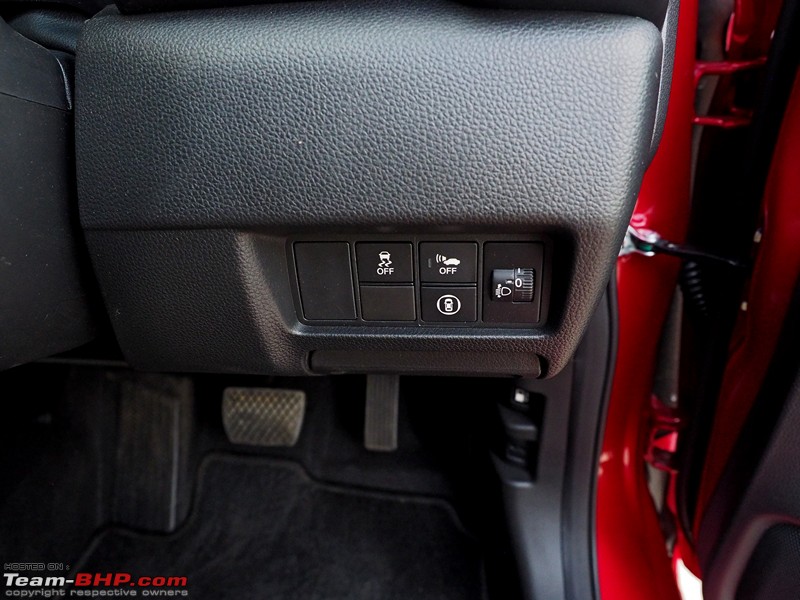 Does it stay off? Yes, until you switch it on again through the MID menu. Lane Keep Assist System (LKAS) It uses the same principle as RDM, but monitors both sides of the lane. You can switch it on using a switch on the steering wheel. It will initially state "System Activated" and then "System Starts Operating", once it has calibrated reading the lane markings. Did we stay on the straight and narrow? Yes, whenever there were markings, it was quite effective. Take your hands off the wheel, it will gently provide inputs to stay within the lane. But within 30 secs, it will alert you to put your hands back on the wheel. Ideally, you can hold the wheel lightly and the car will steer: 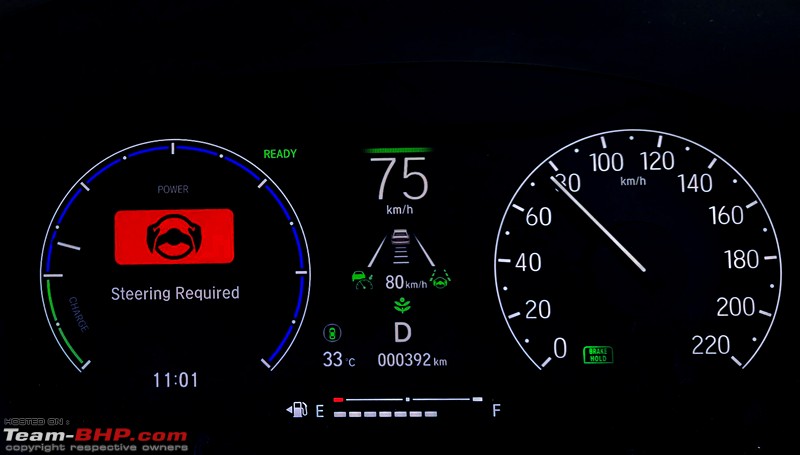 Does life get easier while crossing the line? If you flick the indicator, it cancels the system in order for you to change lanes. It is no Tesla in the sense that it will not steer into the next lane for you. If you do not signal, the system beeps and you get a warning message. Does this really work in a Practical Sense? Unless you are in thick lane traffic (e.g. Andheri to Kala Ghoda commute) or a well patrolled highway, or a cool dawdling driver, it may not work as expected. On a crowded highway, due to our right hangers and left bangers (trucks crawling on the right lane and bullock carts in the left lane), one needs to steer in and out. If you are able to indicate for every planned move, it would work. In real life, a lot of our lane changes are dynamic and opportunistic. One does not always get to signal well in advance when one spots a fast disappearing gap! LKAS turns on only after 72 km/h provided you enable the system from the steering button. The system deactivates below 65 km/h. When the LKAS symbol on the MID changes from white to green, it means the system is active and is steering within the lane. When it's white it means it's on standby: 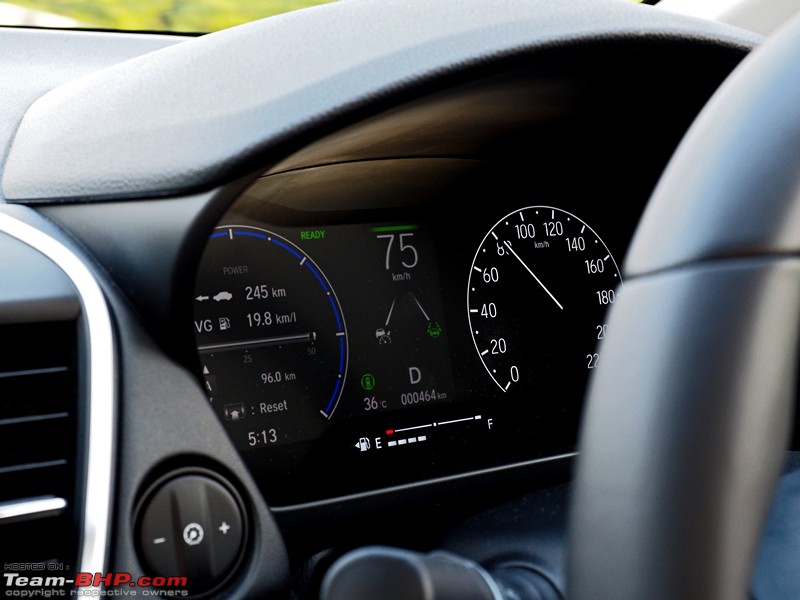 Adaptive Cruise Control (ACC) This is a camera based cruise control and the most practical feature of the suite. This is an all or nothing feature. The cruise control works in ACC mode or not at all. It senses any vehicle up to 120 m ahead in a straight line. Unlike VAG cars where everything is simple and accessible through the stalks, all the controls in the City are scattered all over the steering wheel: 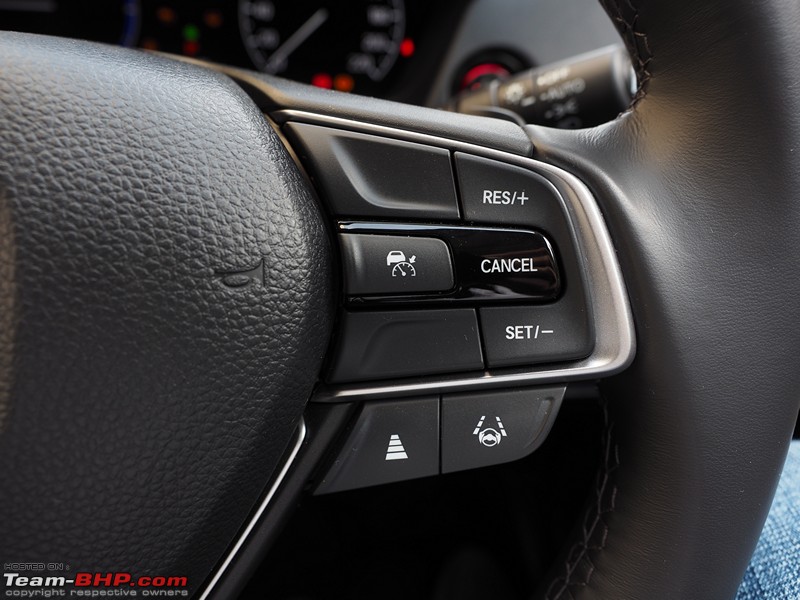 One can set the speed and increase or decrease it. You also have the option to set the vehicle interval (distance behind the vehicle in front). This provides the opportunity to compensate for longer braking distances in the wet. Did it work? It worked very well. It is a bit creepy and it takes a while to build confidence. It does beep if it deactivates below 30 km/h or when a vehicle is detected in the distance. Auto High Beam We did not get to try this out, but this is a very simple 0 or 1 system. It detects oncoming headlights and switches to low beam. Very unlike Audi or Mercedes who shape the beam through a matrix of LED's. Why would one call it a suite of features? There are a lot of inter-relationships between the different components of the Honda Sensing system. Please see our analysis below: 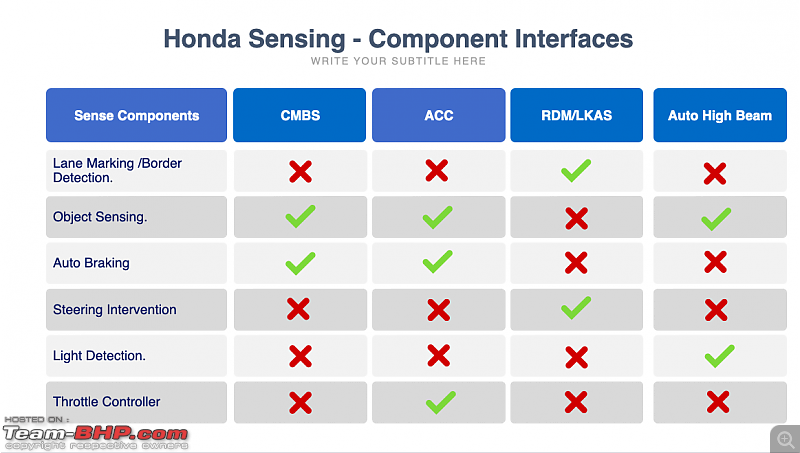 In summary, The Honda Sensing suite is very useful and could be lifesaving. However, some things go against it. 1. The user interfaces and displays are cluttered. The driver information interface is a bit of an information overload. 2. A lot of buyers might not be actual drivers. They might walk in for the fuel consumption, but when they take a test drive with their chauffeur, who would take time to understand the features, the bongs and the beeps might put them off. 3. Other than CMBS all the other aids can be turned off and will be in that position as set by user. CMBS will come back on upon every ignition restart. Last edited by Vid6639 : 4th May 2022 at 10:59. Reason: Sense and Sensing |
| |  (53)
Thanks (53)
Thanks
|
| The following 53 BHPians Thank Vid6639 for this useful post: | 2himanshu, CEF_Beasts, Chaman K, Cyborg, dailydriver, Dani7766, Doc_nerd, Dr.AD, fiat_tarun, FlyWheel8, Gaboonviper04, GaryTSI, gauravanekar, GKMahajan, GTO, Harjot37, hdman, InControl, jomson13, klgiridhar, libranof1987, Lobogris, N33raj, naadopaasaka, neil.jericho, ninjatalli, Osteon206, pd1108, Peri_patetic99, Rahulkool, RavenAvi, rideon74, roby.thomas, ron178, sainyamk95, saisree, shashanka, SILVER-ARROW, SlowRider, SnS_12, sups, Swarup5, theexperthand, themonster, The_Outsider!, uday.ere, vb-saan, Venkatesh, Voodooblaster, vvrchandra, yesyeswe, ysjoy, Yuvuz |
| | #4 |
| Team-BHP Support  | Honda City Hybrid Exterior ImagesThe City has grown in size and now looks a lot more mature. The overall styling is not eye-catching, but understated and clean:  Front gets a very thick chrome strip running between the headlamps and above them:  Rear looks sharp with hints of some BMW design cues: 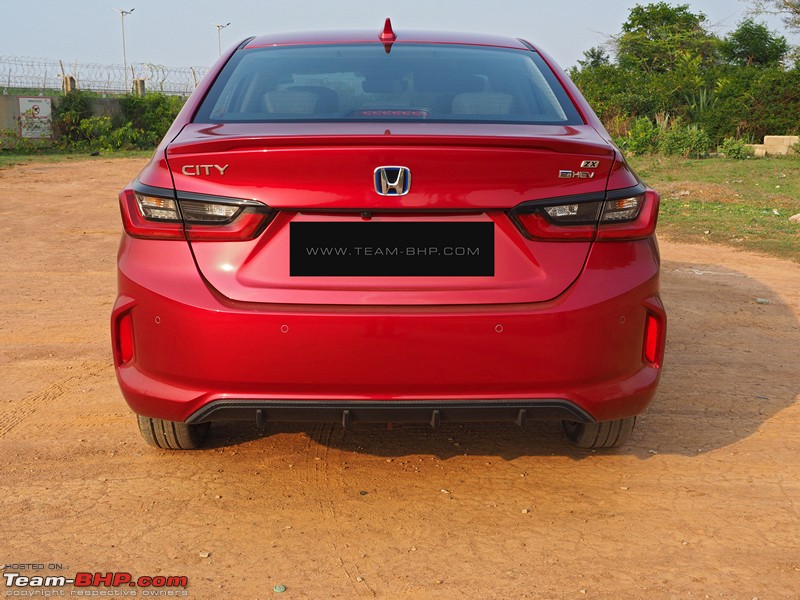 View from the side shows the length of the City. It is now longer than the tenth-gen Toyota Corolla Altis: 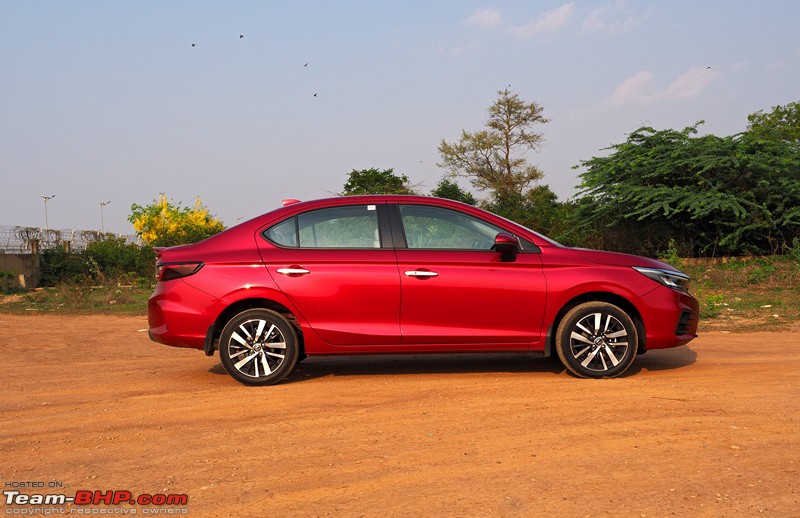 The Hybrid wears an "H" logo with a blue border surrounding it:  Honeycomb mesh radiator grills is unique to the Hybrid:  Claw-like fog lamp extensions are also unique to the Hybrid:  9-element LED headlights with auto high beam:  Internationally, the City RS e:HEV gets a black strip vs this glaring chrome strip running along the width of the car. India should have gotten the black grill as well: 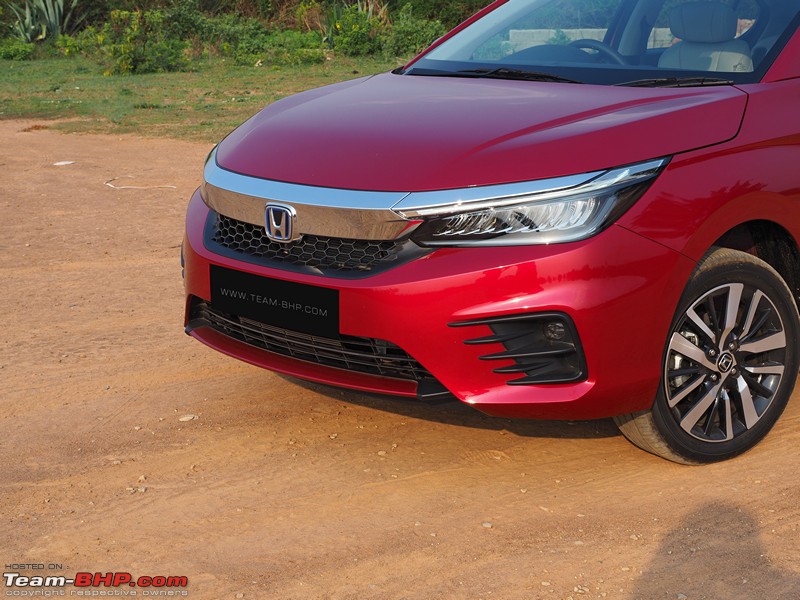 Honda Sense ADAS camera mounted in front of the IRVM:  Useful lane watch camera on the left ORVM shows the blindside traffic on the infotainment touchscreen display:  16" alloy wheels with 185/55 tyres make the car look under-tyred considering its overall dimensions. They are also not low resistance Hybrid specific tyres, but just regular Bridgestones or Goodyears:  Standard fare fuel cap depicting a minimum RON 91 requirement for the Hybrid: 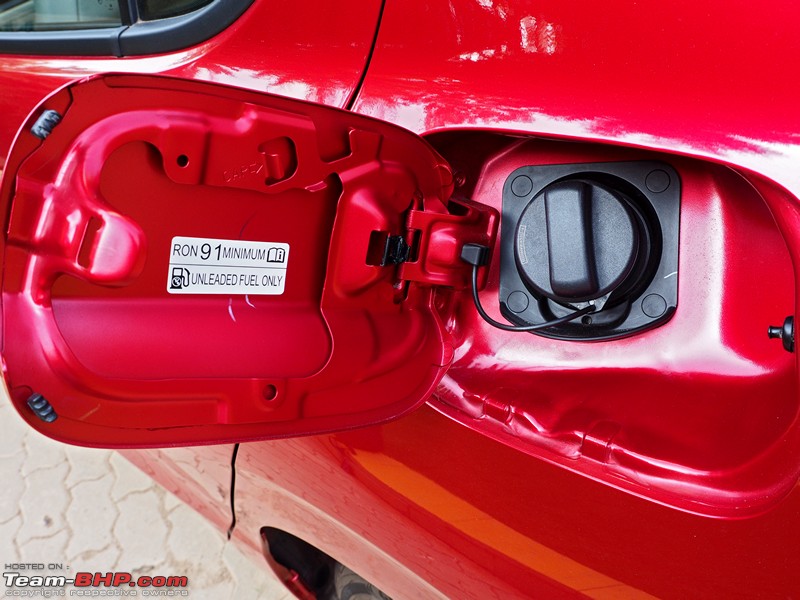 "H" logo at the rear with the blue surround similar to the front:  e:HEV badge on the boot lid indicates that this is a Hybrid:  Boot lip spoiler is only available on the Hybrid variant: 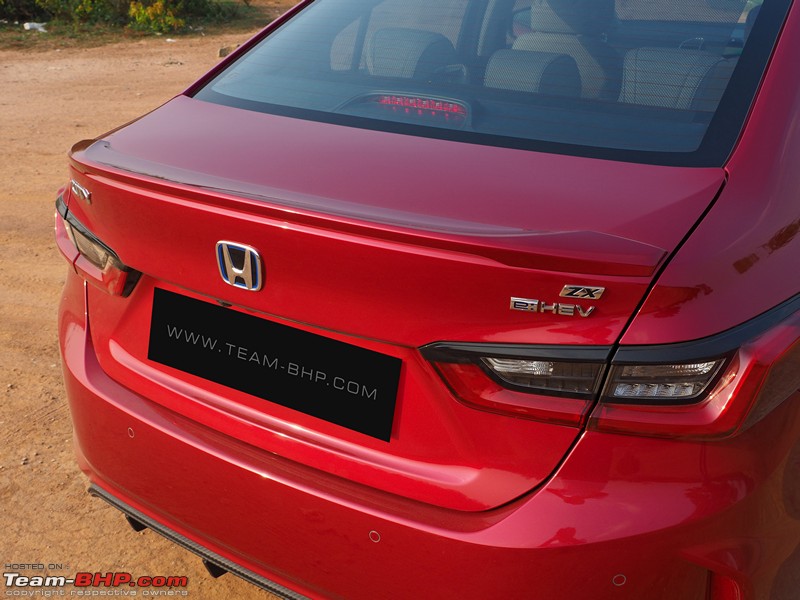 Rear bumper gets a faux diffuser that is finished in carbon-fibre:  The diffuser and spoiler do help in giving the City Hybrid a sportier stance when viewed from the from the rear:  A parting shot: 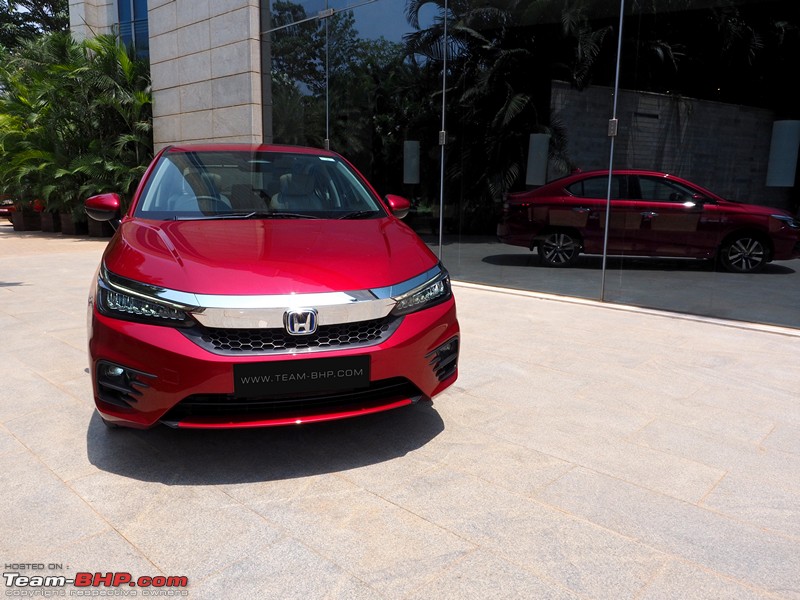 Last edited by Aditya : 2nd May 2022 at 11:06. |
| |  (51)
Thanks (51)
Thanks
|
| The following 51 BHPians Thank Vid6639 for this useful post: | 400notout, carrot_eater, CEF_Beasts, Chethan B G, Cyborg, dailydriver, Deepsp, dkaile, Dr.AD, fiat_tarun, FlyWheel8, Gaboonviper04, GaryTSI, GKMahajan, GTO, Harjot37, hdman, InControl, jomson13, klgiridhar, lamborghini, libranof1987, Lobogris, MDED, N33raj, neil.jericho, Osteon206, pd1108, PrasunBannerjee, PrideRed, punto_, Rajeevraj, RavenAvi, rideon74, ron178, SatishBisht, SILVER-ARROW, SnS_12, sups, theexperthand, The_Outsider!, uday.ere, vaasu, vb-saan, Venkatesh, Voodooblaster, VTec_KickedInYo, vvrchandra, VWAllstar, yesyeswe, ysjoy |
| | #5 |
| Team-BHP Support  | Honda City Hybrid Interior ImagesNew dual tone ivory and black interior scheme for the hybrid looks more upmarket than the beige in non-hybrid. The overall dashboard design is clean and symmetrical. The lowered height of the dashboard provides better frontal visibility along with making the cabin appear more spacious:  The materials used feel like an improvement over the 4th-gen City: 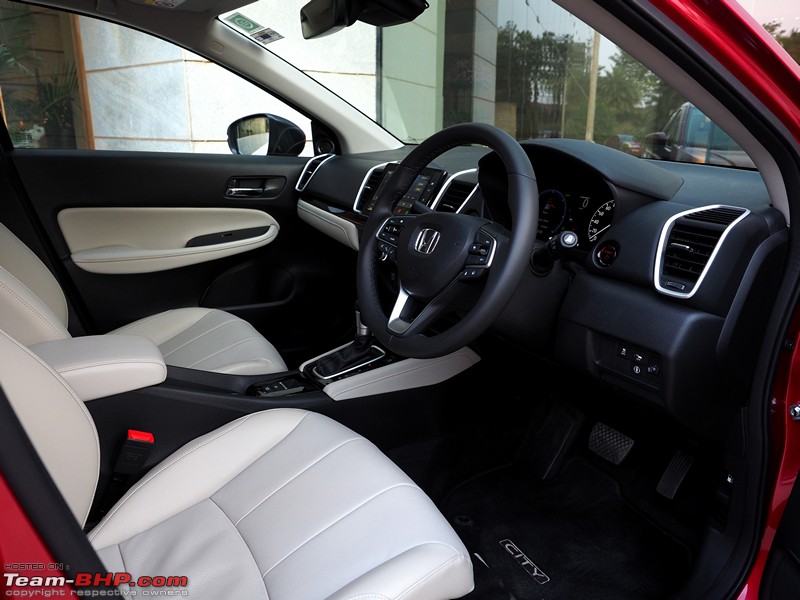 Hard plastics on top with a faux wood strip in the middle and soft leather padding below works well. However, there is more of the hard stuff than the soft materials: 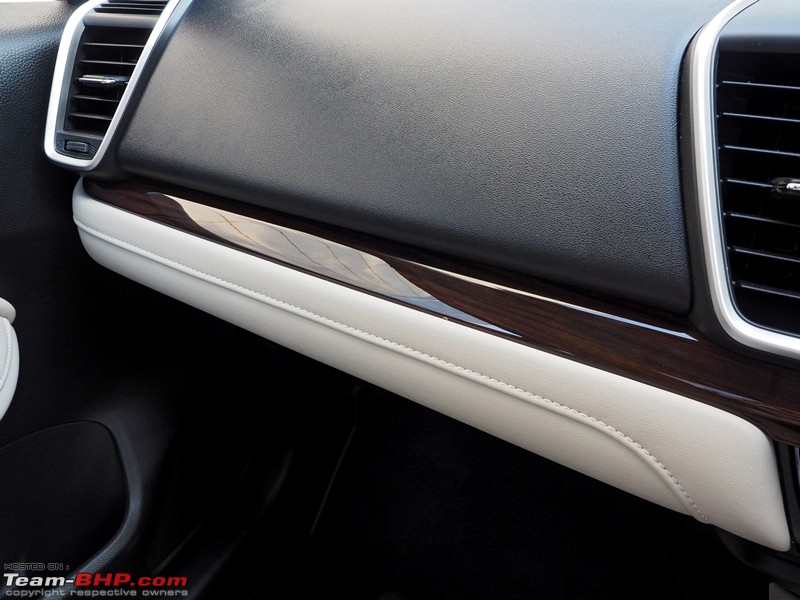 Steering wheel has a very nice design and is great to hold. It's adjustable for height and reach:  Steering-mounted controls are logically laid out. On the left we have controls for audio and below that, the buttons for telephony and voice command. The scroll wheel on the left controls the entire MID. On the right are buttons for the cruise control and below that, are buttons for controlling the adaptive cruise distance to the vehicle in front and the button for activating the lane keep assist system: 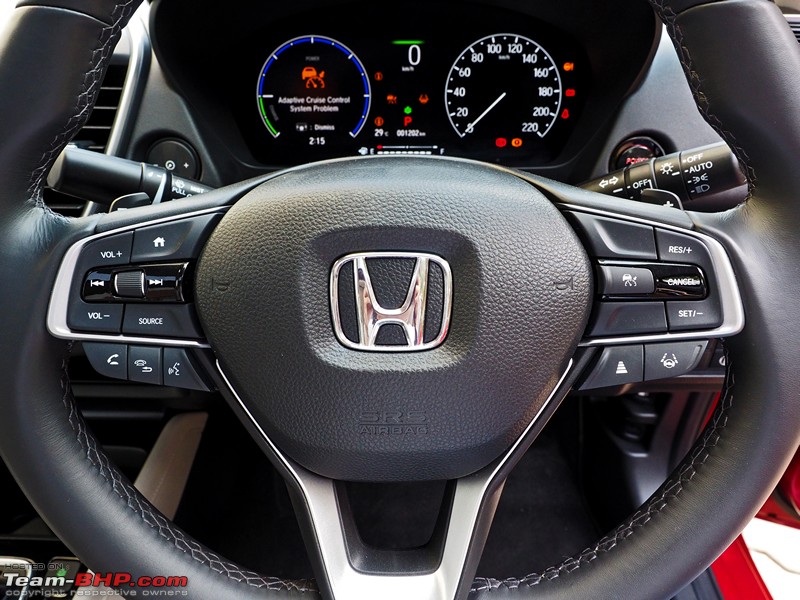 The paddles on steering wheel are not for changing gears since there is no gearbox. They are for controlling the regen braking level. The LHS paddle increases the regen level... 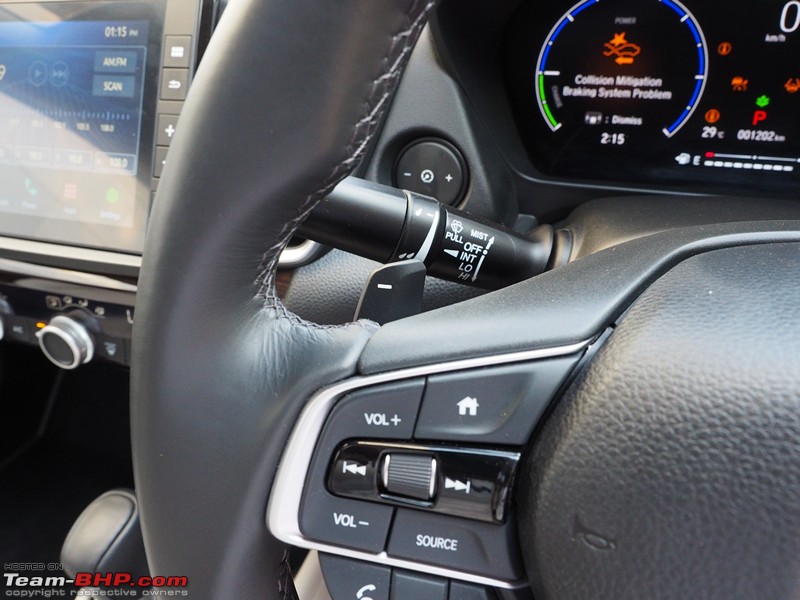 ...while the RHS paddle decreases the regen level: 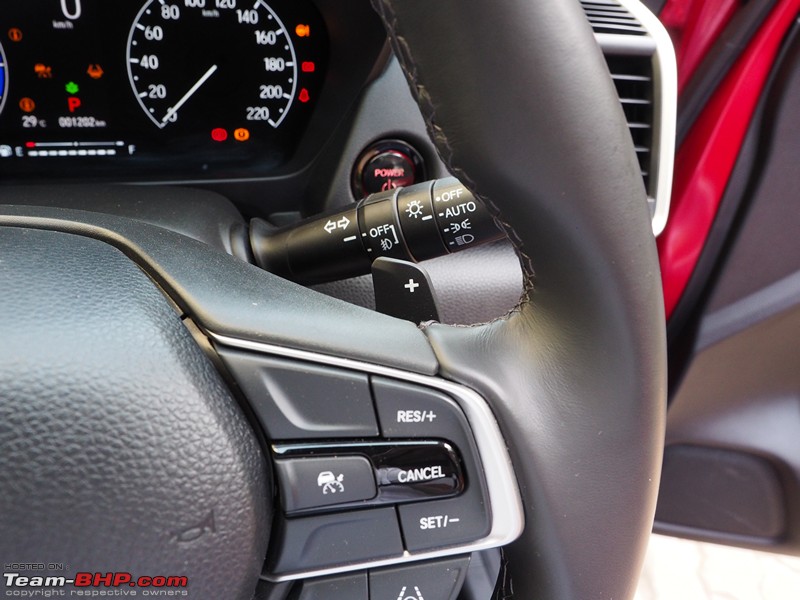 Lane watch camera can be activated by flicking the right indicator stalk or by pressing the button on the side of the stalk: 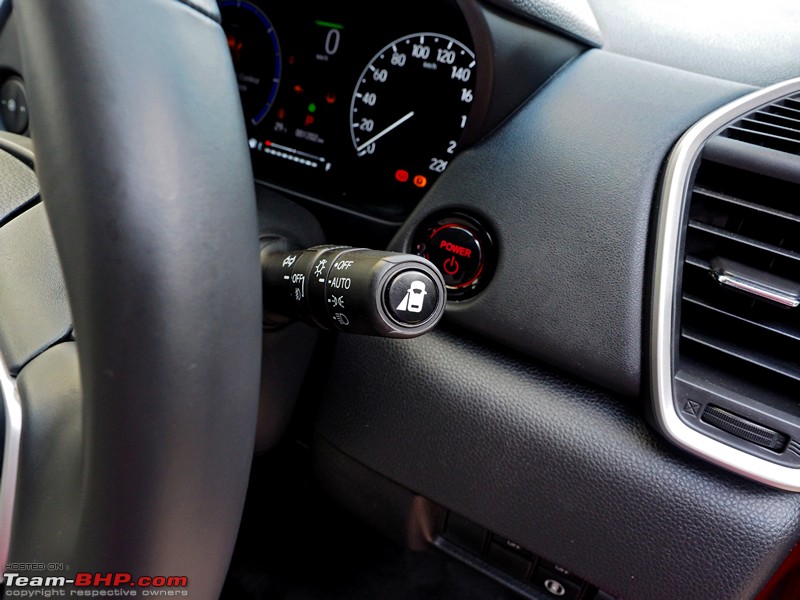 Neat instrument cluster offers a good balance of digital and analogue displays. On the RHS is an analogue speedo, while on the LHS, is a digital screen that has multiple display modes. In this mode it is showing the power/charge meter. Being a hybrid there is no tachometer: 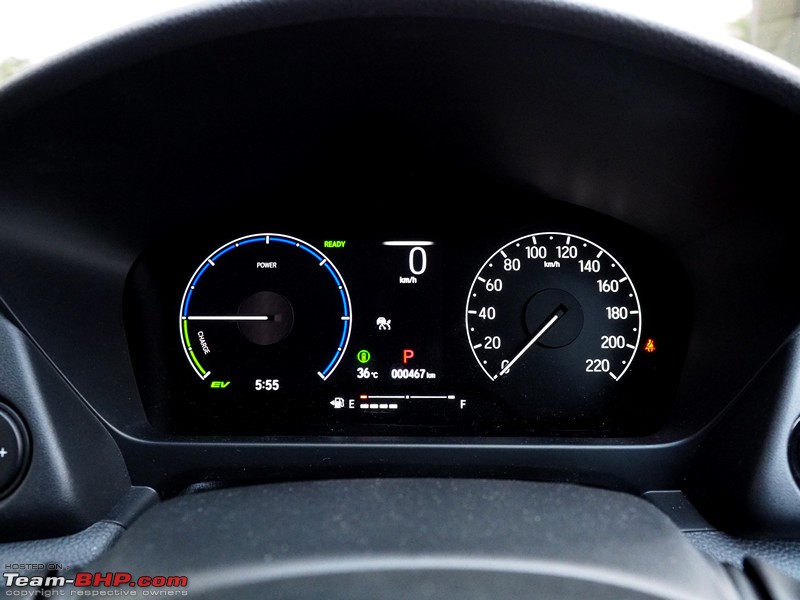 MID is loaded with info and different display modes including a G-force meter, TPMS warning, ADAS warning messages, power flow for the hybrid system as well as trip computer. We found there was too much information in that one screen and you had to keep changing displays to see it. As an example there was no way to see fuel efficiency as well power flow at the same time:  The acoustic vehicle alert system to alert pedestrians of an approaching EV can be turned off using the button below the steering as shown on the MID:  Simple layout showing just the power/charge mode on the screen:  Trip computer display that shows the mileage stats as well as distance to empty. There are 2 trip meters - A & B:  The small green EV symbol at the bottom-left denotes that the car is now in pure electric mode:  Power flow meter shows the battery level and while moving, it shows the direction of power either from battery to wheels or IC engine to wheels or back to the battery from wheels during regen braking:  Piano black start/stop button looks cool: 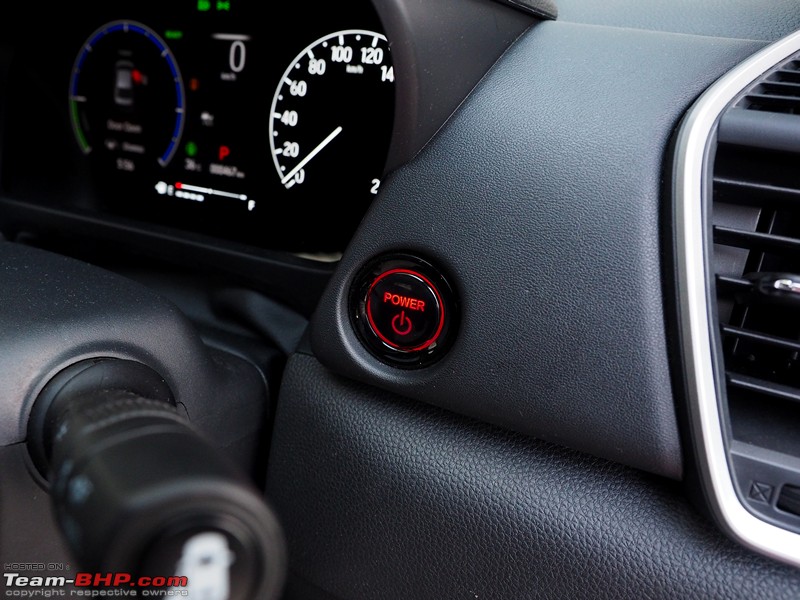 On the right are the switches for operating the VSA and the switch for the acoustic vehicle alert system that turns off the artificially generated external sound when the vehicle is moving in EV mode. Below that you have the menu button for the Honda sense ADAS suite. You can individually disable each one, but they will again turn on when you restart the car:  Front doorpads are clean and simple with soft padding in the armrest area. Door pockets can hold a 1L bottle and some knick-knacks each:  In a shocking move, Honda has equipped the City with auto up and auto down functions for all four power windows. It took me a while to believe this till I tested each one. What's even more surprising is that feature has been on the ZX variant of the regular City as well. Well done Honda: 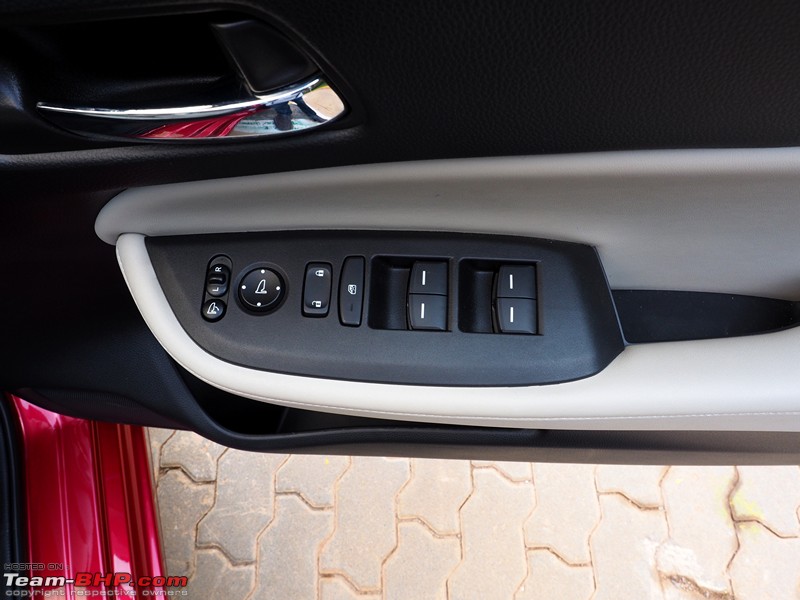 Front seats are comfortable with the driver's seat being height adjustable. Sadly, the seats are neither electrically adjustable, nor are they ventilated. They also lose out on lumbar adjustment as well and the default lumbar support is a tad on the higher side:  A close look at the new ivory-coloured leather upholstery. It has more of a grey tone to it compared to the creamy beige of the regular City: 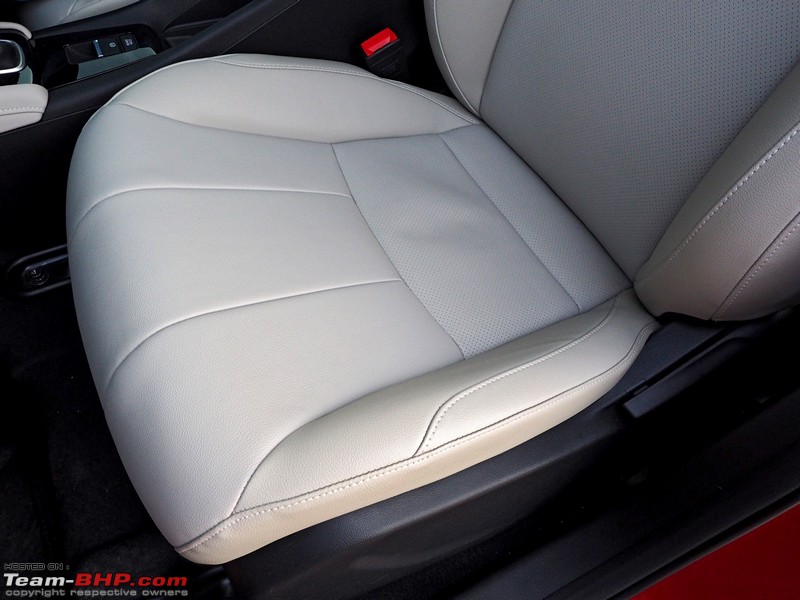 Center armrest is leather-clad and comfortable to use: 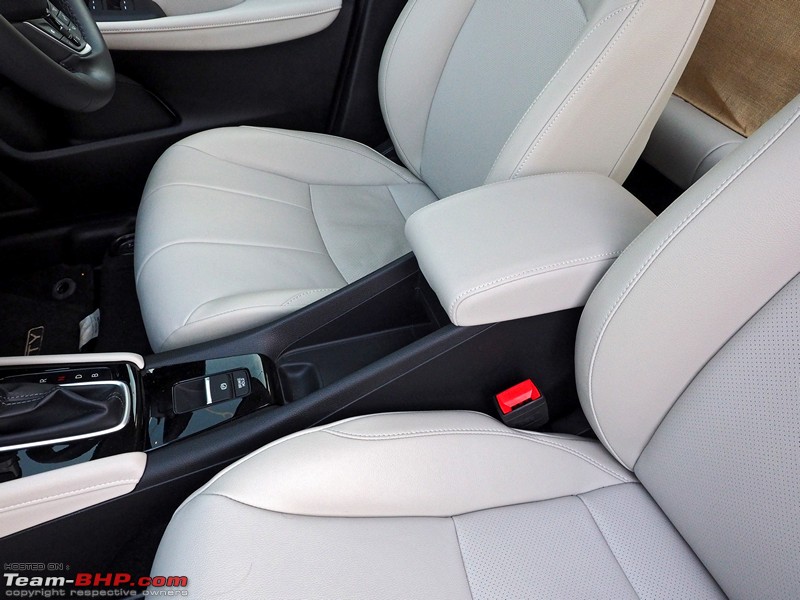 Spacious footwell with a very wide dead pedal. Honda could have stretched the black carpet a little higher. The insulation material easily visible when you bend down even a little: 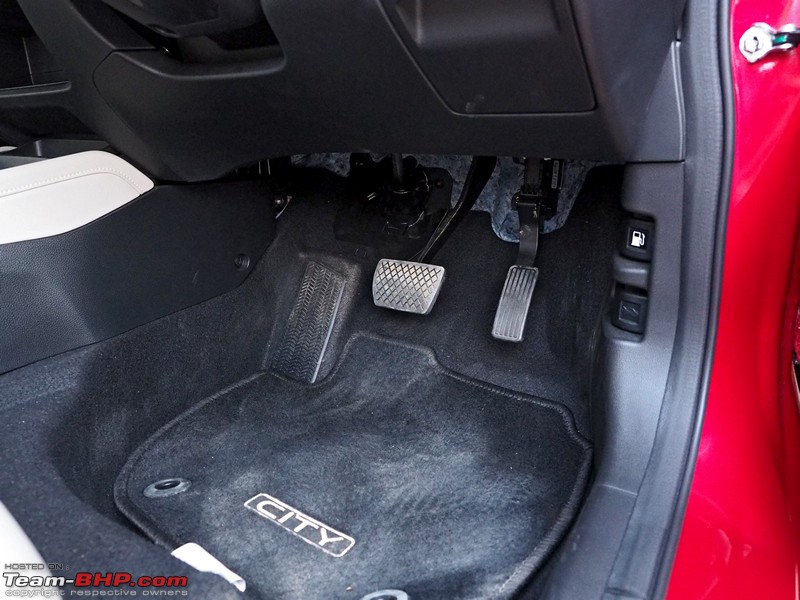 Frameless auto-dimming IRVM provides an adequate field of vision with nothing to complain about: 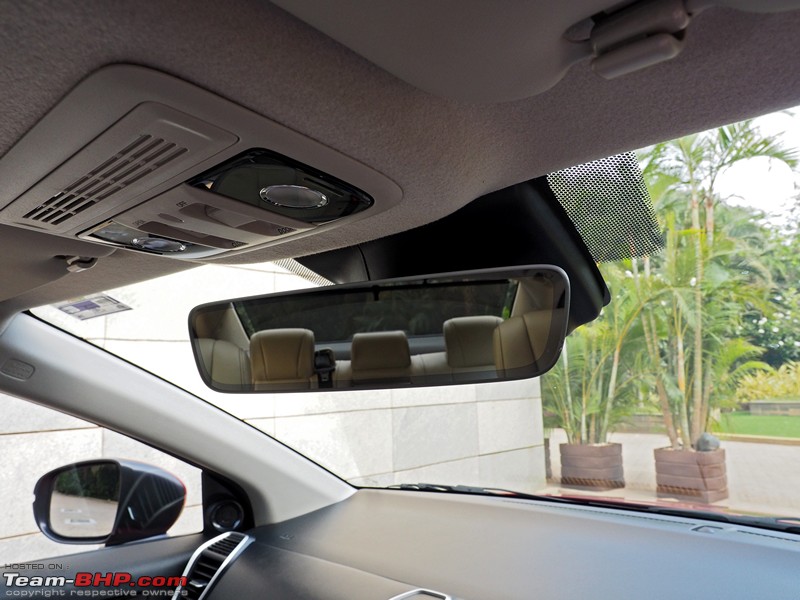 ADAS camera module behind the ORVM is completely hidden when you set the ORVM to your driving position: 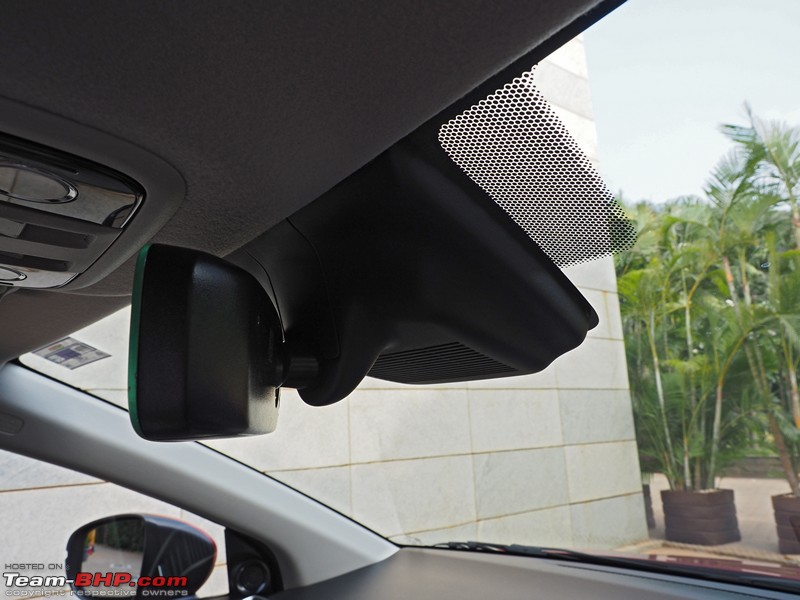 Touchscreen infotainment head-unit is taken from the regular City and is average to use as well as in terms of sound quality. It does get connected tech and can be paired with a smartphone as well as a smartwatch: 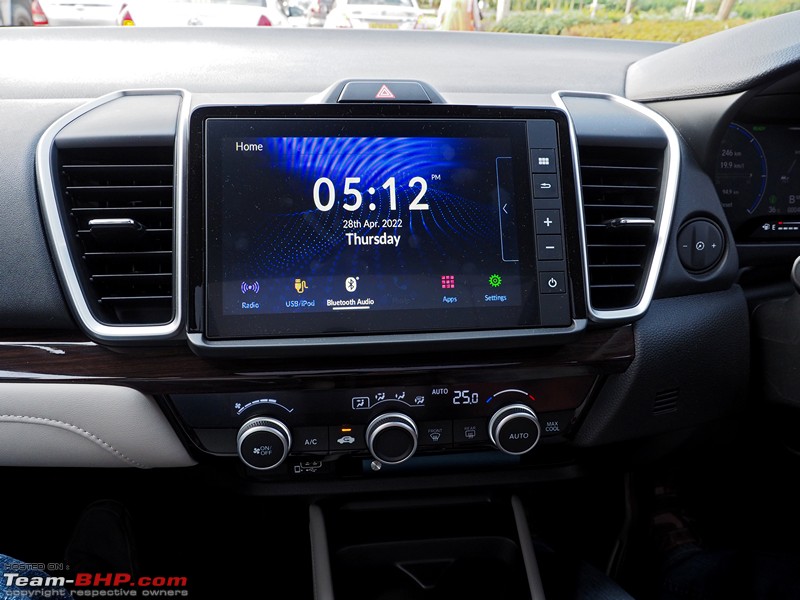 Storage space in front the gear lever consists of two cup holders, small pocket in front of that and a shelf to store a phone above that. You also get 2 USB ports for connecting to the head-unit and a 12V power outlet: 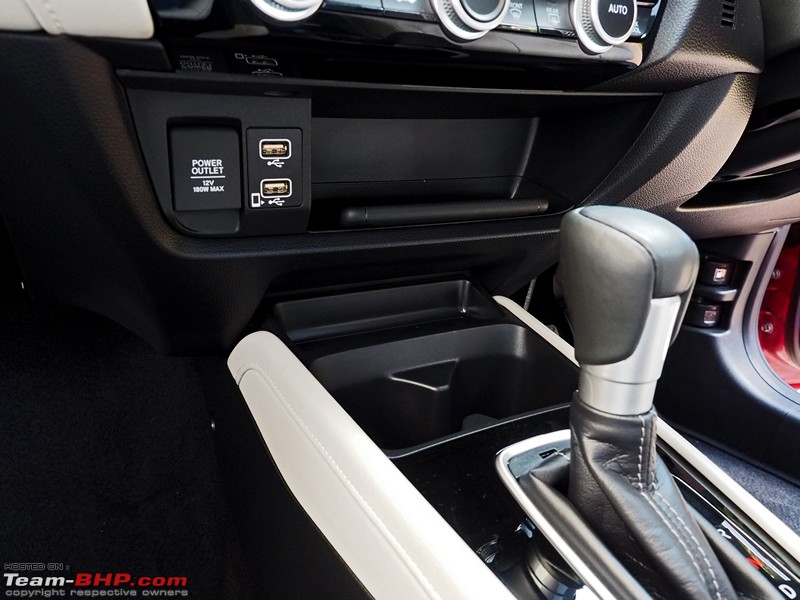 Identical gear lever to that of the regular City. Notice the "B" mode for maximum engine braking: 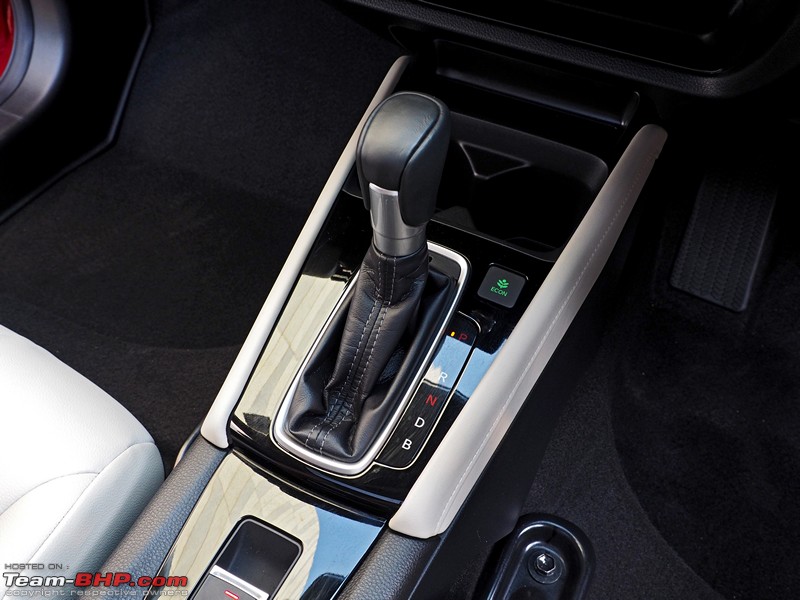 The Hybrid loses the manual handbrake, liberating the space for keeping a smartphone: 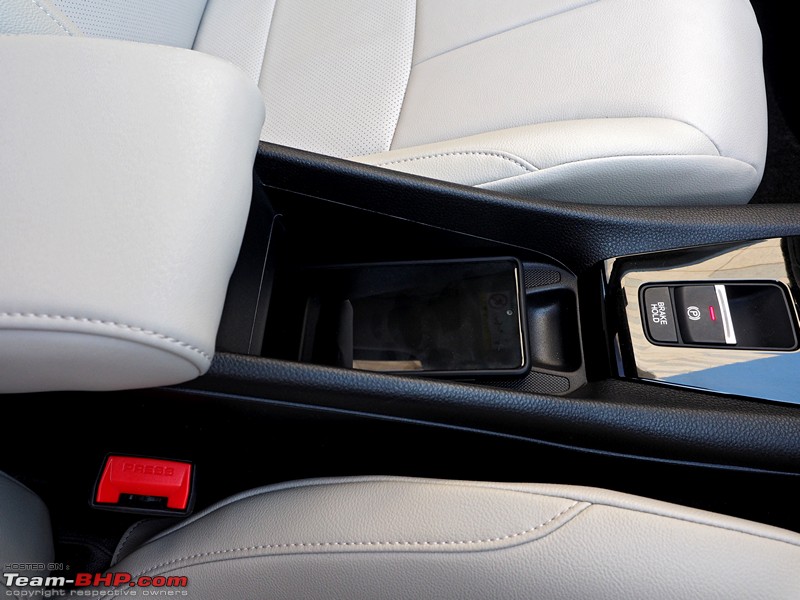 However, the lack of wireless charging means that you will see an ungainly cable coming from the USB port in the center fascia to the center console: 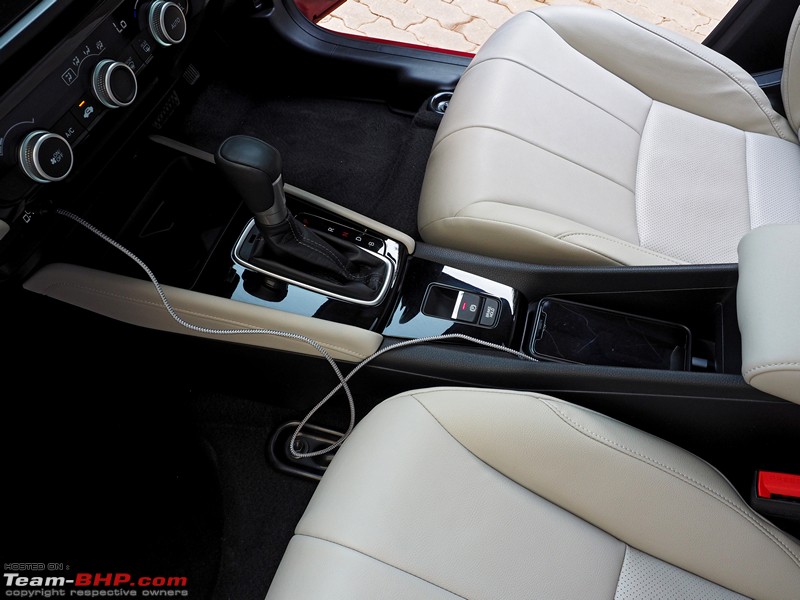 Electric parking brake with auto hold that switches off every time you turn off the car is rather strange: 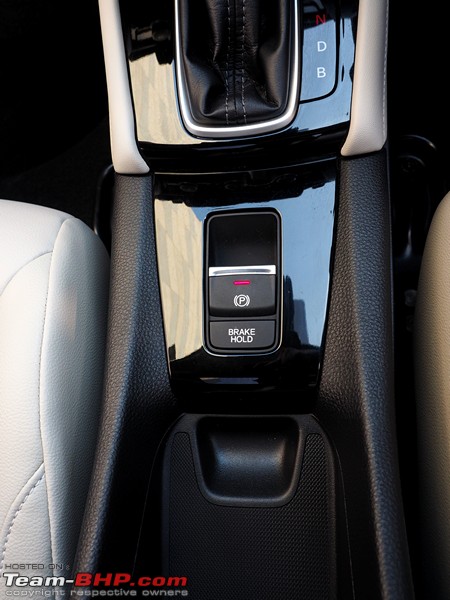 Glovebox is average-sized. It is neither illuminated nor cooled: 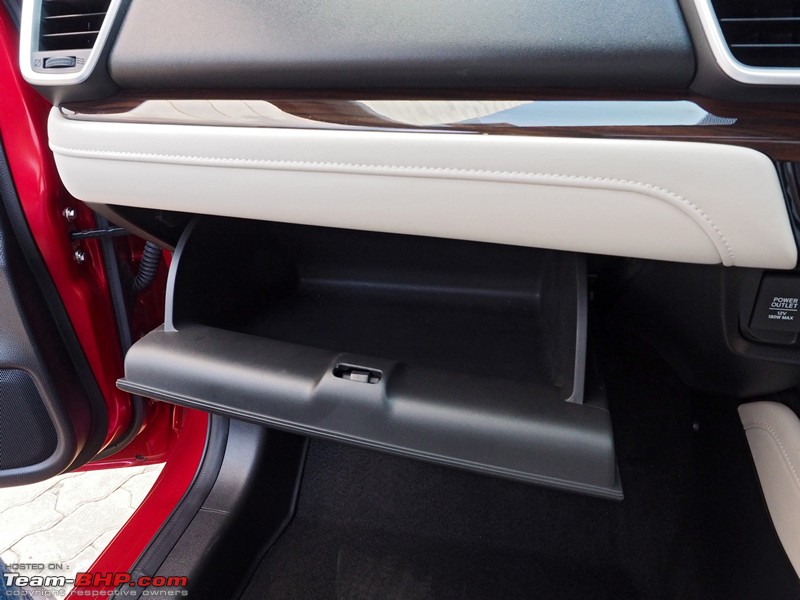 Roof bezel consists of individual map lights as well as controls for the sunroof: 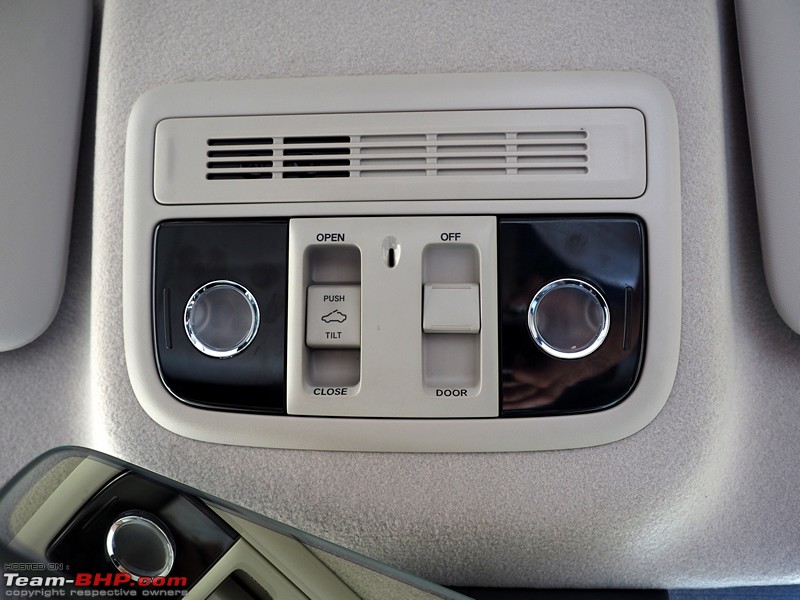 Rear doorpads have soft padding around the armrest, but the rest is all hard plastic:  Honda's rear seat remains amongst the best in the segment. It is well designed and offers good support and comfort. While the car is low, ingress & egress is still reasonable thanks to the wide gap between the B-pillar and seat. Rear headrests are fixed, but work well even for taller occupants like me (6'):  The RHS backrest has a vent for cooling the battery pack in the boot:  Rear air-con vents have options to adjust the air volume as well as direction. However, the vents are useful when the blower is set past level 4 at the front. You also get two 12V charging ports down below:  Rear sunblind is a boon in the summer. We wish Honda provided it for the windows as well:  Front seatbacks have multiple pockets for keeping stuff. You can easily keep your phone in one of the pockets while charging it:  306-liter boot is smaller than the non-hybrid car's by 200 liters. You can still keep large suitcases as long as they are lying down flat and can fit in that height:  Here's my medium-sized laptop bag kept for reference:  If you lift up the cardboard floor you can see a deep triangular storage area that can hold a soft handbag if needed:  Removing the cardboard floor completely shows the space saver spare as well as the jack stored inside a Styrofoam tray that takes up a lot of space by itself:  Remove the spare wheel and you get a glimpse of the Li-ion battery pack:  Remove the Styrofoam piece that holds the jack you can see the metal frame designed to hold the spare tyre. With the spare tyre and jack removed you have a lot more luggage space:  Remove the other Styrofoam piece and you can see the wheel well that holds the full sized spare in the non-hybrid version:  While the frame surrounding the battery is painted black, the frame behind that is exposed metal that even had mild rust on it. Why would they leave that piece unpainted with weld joints exposed?  135/80 D15 space saver spare tyre:  Boot lid does get carpeting, but the exposed black wiring tube on one side is an eyesore: 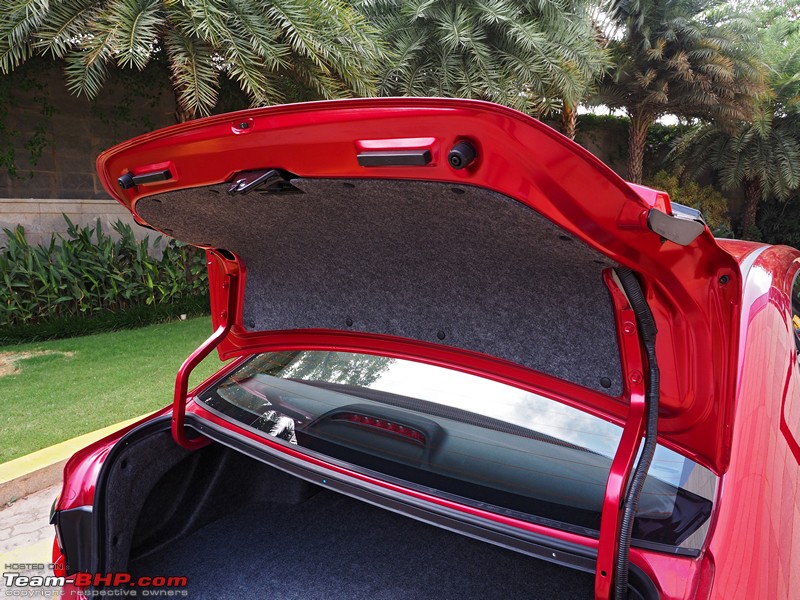 Disclaimer: Honda invited Team-BHP for the City Hybrid test-drive. They covered all the travel expenses for this driving event. Last edited by Vid6639 : 3rd May 2022 at 10:37. |
| |  (95)
Thanks (95)
Thanks
|
| The following 95 BHPians Thank Vid6639 for this useful post: | 2himanshu, 400notout, AayushPopat_97, ags82, aim120, androdev, arjunsatheesh, AROO7, asbshyam, carrot_eater, CEF_Beasts, Chethan B G, CLIX, Cyborg, d3mon, dailydriver, DFendyr, divirokr, dkaile, Doc_nerd, Doge, Dr.AD, Dry Ice, fiat_tarun, fluidicjoy, FlyWheel8, Gaboonviper04, GaryTSI, gearedup, GeeTee TSI, GKMahajan, govigov, GTO, Harjot37, hdman, Herschey, iamswift, IcarusMan, imaginative980, InControl, jomson13, libranof1987, Lobogris, lxskllr, MDED, Meph1st0, mnram, N33raj, Nair.V8, nalinsaxena23, neil.jericho, Omkar, Osteon206, pd1108, PearlJam, PraNeel, PrideRed, RaceHorse, Rajamass, Rajeevraj, RavenAvi, romil.shroff, ron178, RYP, sainyamk95, saisree, shashanka, Shreyans_Jain, Shreyas Aterkar, SILVER-ARROW, SlowRider, SnS_12, sridhu, stringbh, sukhbirST, sups, Swap_Abarth, Swarup5, tabs_vs_spaces, TheBigV, theexperthand, themonster, The_Outsider!, turbospooler, uday.ere, vb-saan, Venkatesh, Vijay T, vineetklkrn, vmathews, Voodooblaster, vvrchandra, yesyeswe, ysjoy, Yuvuz |
| | #6 |
| Team-BHP Support  | Re: Honda City Hybrid Review Thread moved out from the Assembly Line. Thanks for sharing! Last edited by Aditya : 2nd May 2022 at 11:08. |
| |  (4)
Thanks (4)
Thanks
|
| The following 4 BHPians Thank Aditya for this useful post: | GKMahajan, GTO, themonster, uday.ere |
| | #7 |
| Senior - BHPian Join Date: Apr 2021 Location: Bangalore
Posts: 1,540
Thanked: 4,166 Times
| Re: Honda City Hybrid Review Nice and very detailed review. One stupid question though, since between 80 to 120 it runs on engine mode and above 120 in hybrid mode, does it mean the efficiency will be more at speeds of 120+ than 80 to 120? From car point, this came out as expected from the teasers. A good car for efficiency and tech savvy customers. Not much for enthusiasts. Key will be pricing, I think if they price it square to Slavia 1.5, which is apprx 3 to 4 lakhs more than top end City it is okay. Anything more than that will take away the the benefits of efficiency. Last edited by sunikkat : 2nd May 2022 at 11:37. |
| |  (1)
Thanks (1)
Thanks
|
| The following BHPian Thanks sunikkat for this useful post: | Rocketscience |
| | #8 |
| BHPian Join Date: Jun 2021 Location: Surat
Posts: 58
Thanked: 185 Times
| Re: Honda City Hybrid Review
Would it not be more efficient to connect directly to wheels (front axle at least) rather than wasting energy in terms of wastages of converting energy in different forms (mechanical to electrical and then again to mechanical rather than mechanical to mechanical)? Other than inefficiency it doesn't seem quite right with the 220kmph speed on the speedometer as even the ZS EV's top speed is 140kmph. |
| |  ()
Thanks ()
Thanks
|
| | #9 |
| Senior - BHPian Join Date: Oct 2007 Location: Seattle/Pune
Posts: 1,409
Thanked: 6,056 Times
| Re: Honda City Hybrid Review Wrapping that whopping big chrome strip in black would be first order of the business for many tbhp members! It looks terrible. Looks apart, I hope the car brings good fortune to Honda's lazy behind. Instead of going fully electric I welcome this hybrid move too. Hopefully the hybrid system doesn't spring too many expensive issues. On a related note, with this car and sedans from VW group the segment suddenly feels alive. |
| |  (10)
Thanks (10)
Thanks
|
| The following 10 BHPians Thank amol4184 for this useful post: | ashwin.terminat, carhead, Chaman K, dailydriver, FlyWheel8, handsofsteel, hdman, Herschey, imaginative980, Peri_patetic99 |
| | #10 |
| BHPian Join Date: Nov 2015 Location: MH01/TS09
Posts: 755
Thanked: 1,924 Times
| Re: Honda City Hybrid Review
I don't think that will be the case. The air resistance will be significantly higher and the hybrid mode will tend to assist in overcoming that rather than adding efficiency. The interesting question would be how long can you hold a 120+ speed? The assumption I have is the engine is putting all power to the wheel, the battery is not being charged (or is it?) and the battery will discharge in some time |
| |  (2)
Thanks (2)
Thanks
|
| The following 2 BHPians Thank 1.2TSI7DSG for this useful post: | sunikkat, viXit |
| | #11 |
| BHPian Join Date: Nov 2008 Location: Bangalore
Posts: 979
Thanked: 4,823 Times
| Re: Honda City Hybrid Review Super review Vidyut! 1. Will Honda honor warranty if battery is allowed do discharge deeply (sticker says drive every 3 months at the minimum). I'm sure they'll have enough monitoring in the car to figure out non usage for a long period of time. 2. Why does engine fire up for quick acceleration when the clutch is disengaged below 80kmph? I'm assuming the tiny 0.7kWH battery can't supply enough current to support the full power draw (80kW) from the traction motor? |
| |  (1)
Thanks (1)
Thanks
|
| The following BHPian Thanks d3mon for this useful post: | niranjanprabhu |
| |
| | #12 |
| BHPian | Re: Honda City Hybrid Review Excellent detailed review Vidyut. A friend of mine was checking for his next sedan (as Linea diesel will have to discarded on 10 years - Delhi). I had asked him to wait for this, but now the 306L boot space sounds a No-Go for a family. Last edited by moralfibre : 26th September 2022 at 00:32. Reason: Typo. |
| |  ()
Thanks ()
Thanks
|
| | #13 | |
| BHPian Join Date: Jan 2019 Location: TN-11, AP-03
Posts: 966
Thanked: 2,528 Times
| Re: Honda City Hybrid Review Very Nice detailed review. Rated this well deserving thread. I feel like I have already did the TD of this car. After a long time, Honda has made a case for itself to have people in its dealerships. So, for a customer whose primary usage is city for daily office drives then this is the car he has to be in. The real ZEN mode. Quote:
Wish they price it sensibly and go bonkers to explain this technology to the masses. | |
| |  (2)
Thanks (2)
Thanks
|
| The following 2 BHPians Thank saisree for this useful post: | Swarup5, Voodooblaster |
| | #15 | |
| BHPian Join Date: May 2010 Location: Gurgaon
Posts: 139
Thanked: 218 Times
| Re: Honda City Hybrid Review Quote:
| |
| |  ()
Thanks ()
Thanks
|
 |






